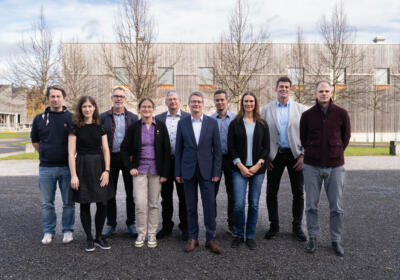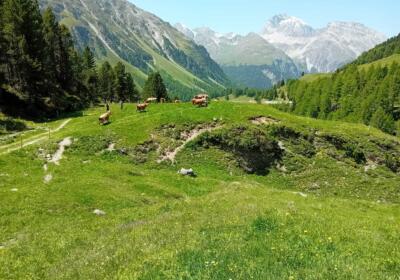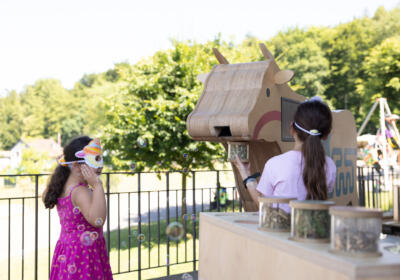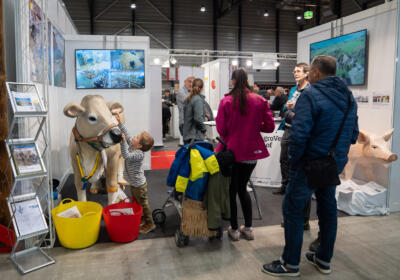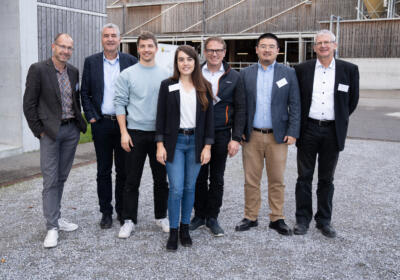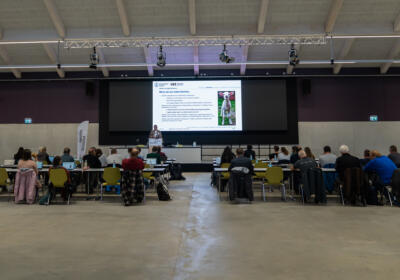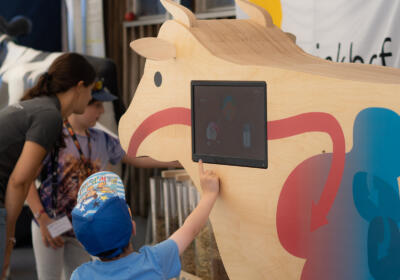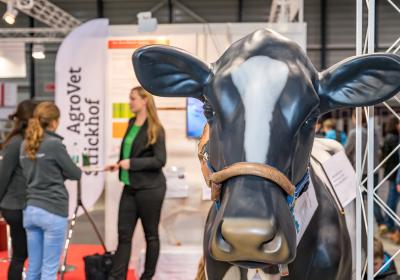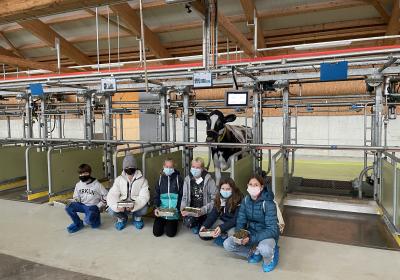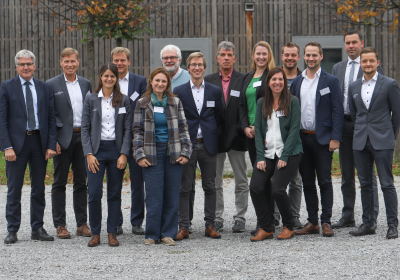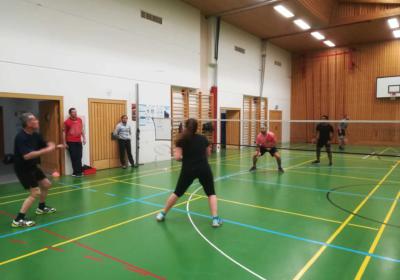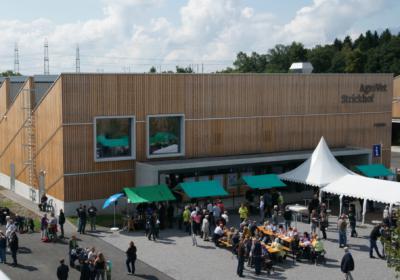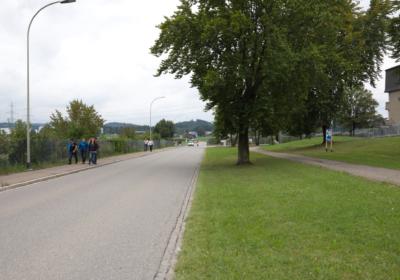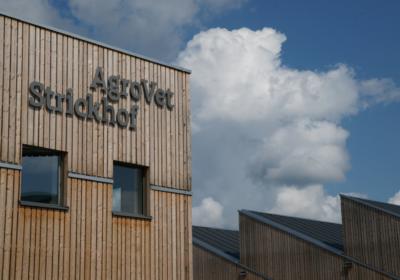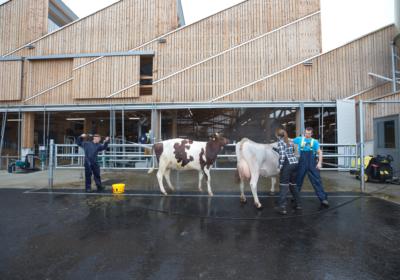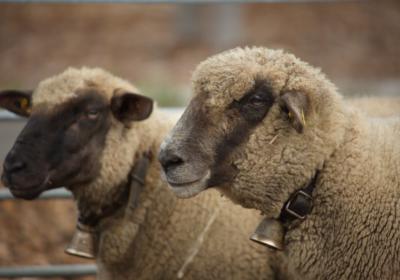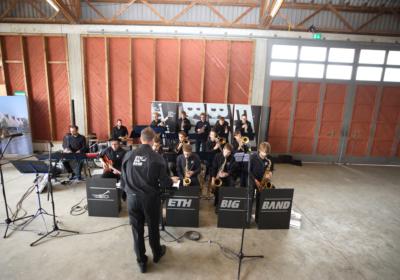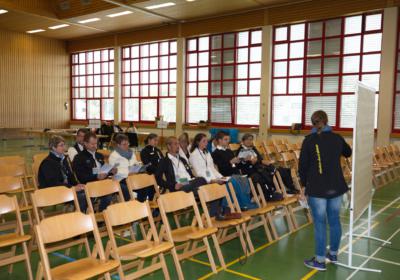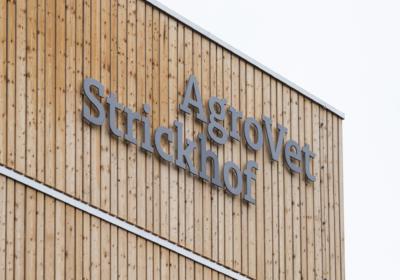AgroVet-Strickhof Conference, 28. October 2025
How can livestock farming be made efficient, sustainable, and adapted to the location? This question was the focus of last week's AgroVet-Strickhof conference.
As in previous years, the AgroVet-Strickhof Conference brought together experts, farmers, students, and researchers, providing a platform for the exchange of knowledge and experience from practice and research.
Marco Pezzatti, Head of the Office for Landscape and Nature of the Canton of Zurich, opened the conference and outlined the criteria that location-appropriate animal husbandry should meet: It must be socially acceptable, use natural resources, be market-oriented and politically coordinated, and enable resource-efficient production. Marco Pezzatti is convinced that many farmers already intuitively practice location-appropriate farming. It is important that the desire for location-appropriate livestock farming does not result in new regulations, as any additional rules could trigger undesirable developments. He considers resource efficiency to be particularly relevant, which could also be equated with sustainability.
When asked what farmers should change in concrete terms, Pezzatti appealed to researchers: they should not lose sight of the Swiss context. “A lot of research is being done, but the findings for Switzerland are often difficult to identify,” he concluded.
Animals and plants belong together
Jean-Marc Chappuis, Deputy Director of the Federal Office for Agriculture, drew global connections: one in three people worldwide is malnourished, and demand for animal products continues to rise – not least due to population growth. By 2050, around 10 billion people will need to be fed. This will require more land or more intensive use of existing land – and as sustainably as possible. “This is a major challenge with many conflicting goals,” said Chappuis.
He emphasized the importance of the circular economy, in which farm animals play a central role – especially as consumers of grass. Greater self-sufficiency is needed to improve food security in Switzerland. This means increasing the production and consumption of plant-based foods and reducing egg, poultry, and pork production, while maintaining beef production at the same level.
Chappuis warned against thinking about sustainability only in national terms: “If we want to increase the sustainability of food production in Switzerland, there is a risk that we will import more products and shift the environmental impact abroad.” His conclusion: it is important not to play plant and animal production off against each other, but to produce both in the appropriate location.
Biosecurity against animal diseases
“Everything has changed radically in the last two years when it comes to animal diseases,” said Gertraud Schüpbach, Dean of the Vetsuisse Faculty at the University of Bern. She gave an overview of the animal diseases currently rampant. Combating and verifying disease-free stocks is costly. Particularly surprising: foot-and-mouth disease has reappeared in Europe and could recur at any time. She emphasized that biosecurity can play a major role in defending against any animal disease, which is why it must be given serious consideration: “Prevention pays off!”
A future with dual-purpose breeds?
Adrian Arnold, President of Braunvieh Switzerland, presented the advantages of dual-purpose breeds. While high-performance breeds are on the rise, the number of Braunvieh cows is declining—even though they can compete in all production systems and are found worldwide.
Heat stress is a growing problem for cattle: the consequences range from reduced performance to metabolic problems. Brown Swiss cattle are significantly more robust than Holsteins and are being selectively bred for heat tolerance, according to Arnold. In addition, Brown Swiss cattle are more efficient and produce fewer nitrogen emissions.
Arnold advocated shifting milk production back to grassland locations and keeping fewer Holstein cows.
He sees research topics in questions such as the extent to which dual-purpose breeds can increase regional self-sufficiency in animal proteins by combining milk and meat production, or how the ecological footprint and greenhouse gas emissions of dual-purpose breeds differ from those of high-performance animals.
In his presentation, Hubert Pausch from ETH Zurich explained the fundamentals of modern breeding work, knowledge of which is necessary in order to address research questions concerning genetically determined differences between breeds. Caren Pauler from Agroscope presented the initial results of an experiment that looked at which cows are best suited to alpine pastures. In her view, performance breeding and the fact that dairy breeds are becoming larger and larger have reduced the suitability of cows for alpine grazing. If alpine pastures are to be used sustainably in the long term, grazing animals that are adapted to the location are needed.
Other presentations focused on current (research) topics related to livestock farming. Thomas van Boeckel from the University of Zurich showed where and how antibiotic resistance is developing globally. Christina Nathues explained how, from the perspective of the FSVO, animal health monitoring should be improved through digitalization and how this data should support livestock owners and veterinarians in their decisions.
Daniel Imhof from Nestlé explained the food industry's perspective on milk production in Switzerland. And in an experiment conducted by the University of Zurich and presented by Niels Verhulst, it was shown that certain probiotics have the potential to reduce midge infestation when applied to the animals' coats.
This year, more than 30 posters presented the latest research findings. Ten researchers also gave short presentations on their work.
IGTP Online Conference
On October 16, 2025, AgroVet-Strickhof, in collaboration with GV-SOLAS, is offering an IGTP online conference for researchers, animal caretakers, technical staff, and GV-SOLAS members.
The thematic focus of our conference is communication about working with animals – making responsibility visible. We have put together an interesting program for the day.
Accreditation for the online conference has been submitted to the Zurich Veterinary Office for a continuing education day for animal caretakers and researchers from Switzerland. Participants from Germany and Austria will receive 6 continuing education hours.
If you have any questions about the IGTP online conference from Switzerland by AgroVet-Strickhof, please contact the event office berliner fortbildungen.
The organizing team:
Melissa Terranova, AgroVet-Strickhof / University of Zurich
Sven Nowok, IGTP Switzerland / ETH Zurich
Which cow is best suited to alpine pastures?
At Alp Weissenstein (GR), Agroscope and AgroVet-Strickhof are investigating which cow breeds are best suited to alpine pastures.
Fifty-four dairy cows of the Holstein, Original Braunvieh, and Hinterwälder breeds spend part of the summer at Alp Weissenstein near Preda (GR), one of AgroVet-Strickhof's research sites. They graze all day long and are milked twice a day in a mobile milking parlor. Researchers observe the cows: Which part of the pasture do they use? Which plants do they prefer when grazing? How much methane do they produce? Finally, the milk yield and its constituents are also analyzed.
Different feeding behaviors
With the “PeaMaps” experiment, the researchers want to find out which breed of cow is best suited to which pasture – the answer may vary depending on the feed supply and terrain. The focus is on the question of which breed of cow feels comfortable under the often demanding conditions of the alpine pasture, has an ecologically sustainable effect, and is financially worthwhile. To this end, an intensive dairy breed (Holstein), a medium-intensive dual-purpose breed (Original Braunvieh) and an extensive dual-purpose breed (Hinterwälder) are being studied.
Alpine pastures in particular vary greatly in terms of feed quality, plant composition, and slope. The experiment aims to show whether extensive cow breeds cope better with poorer feed quality than intensive cow breeds. A similar experiment was conducted with beef cattle in 2018, which showed that extensive breeds tend to stay in steeper areas and graze them more evenly than intensive breeds, which prefer flat pastures and select their feed more selectively.
Grazing promotes biodiversity
Caren Pauler, a scientist at Agroscope, is interested in the question of how breed diversity in Switzerland – especially in the Alps – can be brought back to the pastures. The current trend away from extensive breeds toward intensive breeds is particularly problematic for alpine regions, as their mountain pastures are usually less productive than those in the lowlands. When high-performance breeds are brought to the alps, the area is often no longer grazed optimally or is not grazed at all. Unmanaged pastures become overgrown with scrub, leading to a sharp decline in biodiversity. Targeted grazing, on the other hand, has a positive impact on species diversity. The experiment on Alp Weissenstein aims to show how the available land can be used optimally to ensure sustainable management.
Procedure
The 54 dairy cows are brought to Alp Weissenstein in stages. Eighteen animals arrive at the alp at a time and have two weeks to acclimatize to their surroundings. They then graze on three different types of pasture in succession: a high-quality pasture, a medium-quality pasture, and finally a forest pasture with bushes. On each type of pasture, the researchers record the selection of forage plants and the amount of feed consumed. The animals are equipped with a GPS tracker that records their movement patterns. In addition, the animals' methane emissions are measured using “Greenfeed,” a mobile system for measuring exhaled air. A total of twelve employees work at Alp Weissenstein. Three of them are responsible for regular alpine operations, while the others work on the experiment.
The experiment is funded by the Swiss National Science Foundation. Melissa Terranova from AgroVet-Strickhof emphasizes how important Alp Weissenstein is for this research: “Alp Weissenstein is the only place where such research can be carried out. The effort involved would be far too great for private alpine pastures.”
Text and pictures: Ursina Berger, Strickhof
Annual Report 2024
A year full of ideas, research & education - the AgroVet-Strickhof Annual Report 2024
A year full of ideas, research & education - the AgroVet-Strickhof Annual Report 2024 was a year full of exciting developments - and we take you on a journey through our highlights. Discover research projects of our cooperation partners ETH Zurich, University of Zurich and Strickhof. Find out more about the diverse education of students at our four locations. Click through our annual report and immerse yourself in the world of AgroVet-Strickhof.
Click here for the annual report.
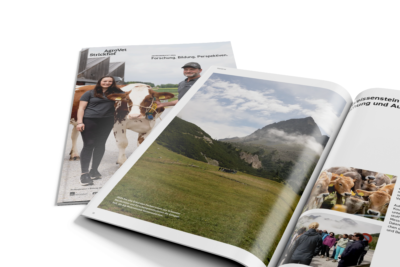
Vetsuisse Faculty: Open Day
The Open Day at the animal hospital attracted around 2,000 interested visitors. The event not only showcased the research facilities, but also made it clear how animal and human health are connected. At the AgroVet-Strickhof stand, adults were able to find out more about our cooperation and children were able to make animal masks.
Swiss Animal Nutrition Conference 2025
Join us on Tuesday, 27th May 2025, at the Forum AgroVet-Strickhof, Lindau (CH) for the 45th Swiss Animal Nutrition Conference, themed “Animal Nutrition in Changing Times”.
Explore the future of animal nutrition with a focus on sustainability, innovative solutions, and cutting-edge research. Engage with keynote talks, research presentations, and interactive poster sessions.
Key Highlights:
- Sustainable dairy nutrition to reduce nitrogen losses
- Innovations in non-ruminant diets and fiber utilization
- Organic agriculture and its role in sustainable animal nutrition
- Networking with researchers, professionals, and students in the field
- Abstract submission open for poster presentations!
Register today and find all details here: Don’t miss your chance to be part of this impactful event!
Schweizerische Tierernährungskonferenz 2025
Important: The event will be held in English and there will be no simultaneous translation.
Don’t miss your chance to be part of this impactful event!
Spring Conference
The SVT organizes an annual spring conference on a current topic in the field of livestock science. Topics are discussed controversially from various perspectives and bridges are built to practice and consumers.
The latest research and development results from Switzerland are presented at regular intervals.This year's spring conference will take place on March 25, 2025 at AgroVet-Strickhof.
Title: What role does artificial intelligence play in livestock farming?
Program und Registration
Registration deadline is March 17, 2025.
Früebüel at "Zugerberg"
ETH researchers listen to the grass “breathe” here
Zentralplus visited Früebüel and conducted an interview with Hans-Ruedi Wettstein. From the climate - comparable to that on the Maiensäss, to a research project with low-meat dairy cattle, to a field measuring station that measures how different gases behave on the grassland.
The following article reports on the spectacular story of Früebüel.




Food Day @ETH
What role does research and innovation have in accelerating the transition to sustainable food systems?
Join Food Day @ETH to take part in workshops and discussions focused on food systems innovation and research. You will be part of a diverse audience from academia, industry, government, and international organizations.
Date: Wednesday, 30 October 2024
Times: 14:00 – 16:30 CET (Workshops)
16:00 – 17:00 CET (Poster Session and Coffee Break)
17:15 – 21:00 CET (Plenary & Networking Poster Session)
Location: ETH Zurich, Main Building
The call for posters is now open! Here you find more information about the event.

Farm animal colloquium "3R for the big ones too" from 27.09.2024
This year's livestock colloquium will take place for the first time in Berlin at the Federal Institute for Risk Assessment (BfR) on Friday, September 27, 2024.
As in previous years, the event will be offered in a hybrid format to give German and Swiss interested parties equal opportunity to participate. This year's focus is on the presentation of current scientific work on the topic of 3R.


Sustainable mooing
On 18.6.2024, a guided tour will take place at AgroVet-Strickhof under the motto “sustainable mooing” (organized by ETH Public Tours).
Spring Conference Animal Nutrition 2024
Register Now: Spring Conference Animal Nutrition:
The Role of animal nutrition in sustainability goals for Switzerland and beyond.
Don’t miss this chance to gain exclusive insights into the latest research findings on animal nutrition focusing on the contribution that animal nutrition can make to the implementation of current agricultural policy goals.
Experience inspiring presentations and an interactive poster session. But above enjoy the opportunity to exchange ideas with like-minded people. The program you will find here.
Do you have research results that fit the theme of the conference?
Don’t miss the chance to present your work to researchers, teachers, employees of companies and organizations, agricultural advisors, other interested persons from the field of agricultural sciences. see the program for details of how to submit your abstract by 30.04.2024.
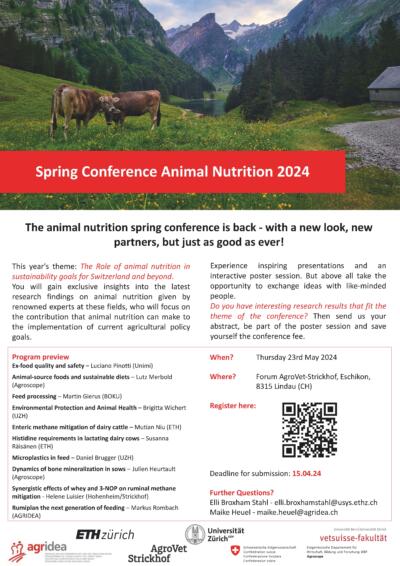
Alpaca nanoantibodies in the fight against cancer, Alzheimer's and co.
At the Nanobody Service Facility, a technology platform of the University of Zurich, scientists are using nine alpacas to produce nanoantibodies with very special properties. The clients are university hospitals, ETH researchers and other interested research groups. “Puls” presenter Daniela Lager visits the animal employees at AgroVet-Strickhof and wants to know from the research managers how alpaca blood is being turned into a beacon of hope for medicine.You can see the report under the following link:
Puls-Sendung Alpaka-Nanoantikörper im Kampf gegen Krebs, Alzheimer und Co.
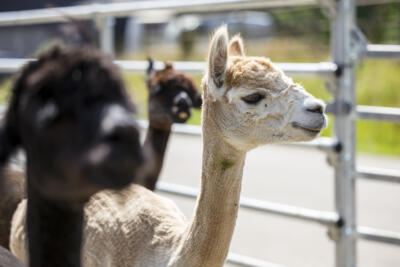
Tier&Technik
AgroVet-Strickhof ist vom 22. bis 25. Februar in St. Gallen an der Tier&Technik mit einem Stand zum Thema Smart Farming präsent.
Besuchen Sie uns in der neuen KB-Halle, kommen Sie mit unseren Beraterinnen und Beratern ins Gespräch und informieren Sie sich über aktuelle Forschungsprojekte und über Lehrgänge wie die Betriebsleiterschule, die HF Agrotechniker/in oder die Fachausbildung Bäuerin/Bäuerl. Haushaltleiter.
Wir freuen uns auf Ihren Besuch.
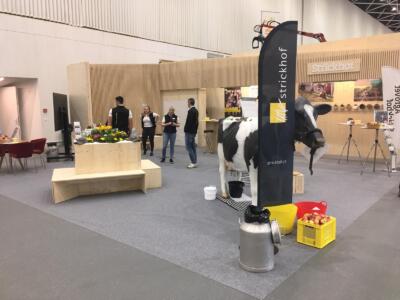
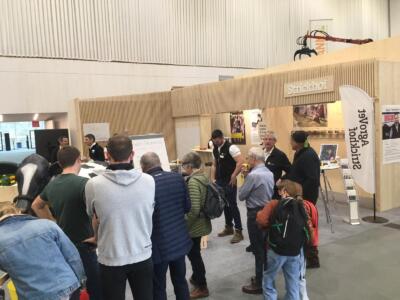
IGTP-Online-Tagung
Am 19.03.2024 bietet AgroVet-Strickhof in Zusammenarbeit mit GV-SOLAS eine IGTP-Online-Tagung für Forschende, Tierpflegende, technisches Personal und GV-SOLAS Mitglieder an.
Der thematische Schwerpunkt unserer Tagung liegt auf der Forschung mit landwirtschaftlichen Nutztieren. Wir haben ein interessantes Tagesprogramm zusammengestellt.
Eine Akkreditierung der Online-Tagung beim Veterinäramt Zürich ist eingereicht für einen Weiterbildungstag für Tierpflegende und Forschende aus der Schweiz. Teilnehmende aus Deutschland und Österreich erhalten 6 Fortbildungsstunden.
Für Fragen rund um die IGTP-Online-Tagung aus der Schweiz von AgroVet-Strickhof steht Euch das Veranstaltungsbüro berliner fortbildungen gern zur Verfügung.
Wir freuen uns, Euch im März online bei Zoom willkommen zu heißen.
Euer Organisationsteam:
Dr. Patricia Zollinger, Stellv. Leiterin Forschung, AgroVet-Strickhof / Universität Zürich
Sven Nowok, IGTP Schweiz / ETH Zürich
Programm
Themen und Vortragende am Dienstag, 19. März 2024, 09:00 – ca. 17:00 Uhr
- Virtueller Rundgang AgroVet-Strickhof (Dr. Sergej Amelchanka, ETH)
- Potenzial und Grenzen von Nutztieren als Alternative zu Mausmodellen (Prof. Dr. Katrin Giller, Universität Hohenheim)
- Smart Farming - digitalisierte Tiergesundheitsüberwachung im Stall (Prof. Dr. Matthias Schick, Team Tierhaltung Strickhof)
- Chancen und Nutzen langlebiger Milchkühe in der Schweiz (Dr. Markus Rombach, AGRIDEA)
- Kamerasystem Schweine (Dr. Thomas Echtermann, UZH)
- Tierversuch unter erschwerten Bedingungen: Forschung an Rindern auf Bergweiden (Dr. Caren Pauler, Agroscope)
- In vivo vs. in vitro Versuche beim Rind (Dr. Melissa Terranova, ETH)
- Zahngesundheit (Prof. Dr. Marcus Clauss, UZH)
Programm- bzw. Themenänderungen vorbehalten
Teilnahmegebühren
- GV-SOLAS Mitglied: 33,60 € (40,00 €)
- Kein GV-SOLAS Mitglied: 42,01 € (50,00 €)
- Azubi:ne: 29,41 € (35,00 €)
Für Teilnehmende aus der Schweiz verstehen sich die vor der Klammer angegebenen Preise als Endpreise. Für Teilnehmende aus Deutschland gelten die in der Klammer angegebenen Preise (inkl. Mehrwertsteuer). Für Teilnehmende aus einem nicht-deutschen EU-Land besteht die Möglichkeit, sich für die Rechnungsstellung von der Umsatzsteuer befreien zu lassen. Bitte geben Sie hierfür die VAT-Nummer im Anmeldeformular an.
Fortbildungsstunden
Eine Akkreditierung der Online-Tagung beim Veterinäramt Zürich ist eingereicht für einen Weiterbildungstag für Tierpflegende und Forschende aus der Schweiz. Teilnehmende aus Deutschland und Österreich erhalten 6 Fortbildungsstunden.
Bitte beachten Sie: eine Teilnahmebescheinigung kann Ihnen nur ausgestellt werden, wenn Sie am Veranstaltungstag online bei Zoom eingeloggt und somit namentlich seitens des Veranstaltungsbüros erfasst wurden. Die Bearbeitung von im Nachgang zur Verfügung gestellten Vortragsfolien im Skript berechtigt nicht zum Erhalt einer Teilnahmebescheinigung.
Technischer Hinweis
Für die Online-Übertragung benötigen die Teilnehmenden einen Internetzugang, ein videofähiges Endgerät (PC, Laptop, Tablet) sowie eine entsprechende Tonübertragung (Lautsprecher, Kopfhörer). Spätestens zwei Werktage vor der Veranstaltung erhalten die Teilnehmenden die Login-Informationen und die Möglichkeit, einen Technikcheck durchzuführen.
Suisse Tier - National Trade Fair for Farm Animal Husbandry
From 24th to 26th November 2023 the national trade fair for livestock "Suisse Tier" took place in Lucerne. The trade fair was the place for inspiration and information around the current topics of the livestock industry and especially for personal exchange.
AgroVet-Strickhof was also present as an exhibitor. Everything started with the set-up on Thursday. For the illustration around SmartFarming and current feeding trials, our lifelike cow was ready. The children enjoyed the milking or rather the "goosing" with water at the cow. Besides the research on cattle, current projects on pig health, pig farming and pig feeding were presented.
Monitors not only showed Lindau's facilities, but also drone footage of the four sites and a live feed into the dairy barn.
Last but not least, the visitors were able to get active themselves. In a discovery tour, they were allowed to answer various questions. Afterwards, young and old received a giveaway from AgroVet-Strickhof.
AgroVet-Strickhof Conference
linking research and practice - with smart animal husbandry into the future
On November 7, 2023, almost 100 participants gathered for the 3rd AgroVet-Strickhof Conference in Lindau on the topic: "Networking research and practice - into the future with smart animal husbandry". From Martin Hübscher's insight into agricultural practice to the "World Antimicrobial Awareness Week" and virtual fencing systems - it was an exciting program! We would like to thank everyone for coming and hope to see you soon at SwissTier Lucerne.OLMA in St. Gallen 2023 - AgroVet-Strickhof is also represented
The Canton of Zurich will be a guest canton at the OLMA in St. Gallen from October 12 - 22, 2023. The appearance under the motto "Familie Zürchers Garten" is intended to create links between town and country, business and culture in a sympathetic way. Under the motto "Familie Zürchers Garten", visitors will encounter a wealth of statistical information about the Canton of Zurich. The garden is an ideal breeding ground for a fresh and surprising presentation that provides a sympathetic insight into the diverse living and economic environment of the Canton of Zurich.
In addition to the traditional parade of the guest canton with over 1000 participants, visitors can enjoy the animal exhibition and animal demonstrations with cows, horses, pigs, sheep and goats. In cooperation with AgroVet-Strickhof, the theme of animal husbandry and nutrition will be explored in depth.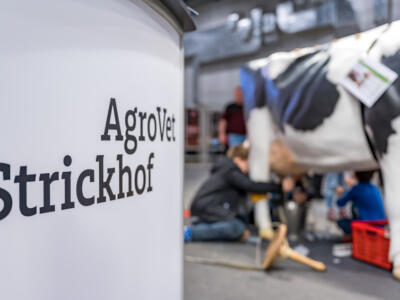
AgroVet-Strickhof Nutztier-Kolloquium „Handling als Refinement im Tierversuch – die Fortsetzung“
On September 26, 2023, the traditional Farm Animal Ethology Colloquium took place at Agrovet Strickhof. Once again, it was held in cooperation with the Humboldt University Berlin and the Federal Institute for Risk Assessment. With 40 participants on site and 35 present online, the event was well attended.
The program was opened by Regula Vogel, Canton Veterinarian and Head of the Zurich Veterinary Office. She illustrated how animal welfare has evolved over the past 30 years and the successes achieved through government funding programs to social media information campaigns. "Animal welfare is a process in which we all participate and bear responsibility, for the benefit of the animals we and society as a whole use!" Just before retiring, Ms. Vogel summed up what a successful veterinary agency needs: Professional standards, good cooperation with other authorities and finally staying power and sufficient resources for results also on a political level.
Imke Traulsen from the University of Kiel, explained how artificial intelligence can be used in the pig house to improve animal health and welfare. Ms. Traulsen also pointed out points of criticism and mentioned hurdles that still need to be overcome in the future.
The title of the program that followed was "Handling as Refinement".
Milena Burri from FiBL explained how handling for slaughter animals can be improved. In addition to studies on pasture and yard killing, a study is currently underway looking at low stress stockmanship when driving and loading livestock to the slaughterhouse. A learning video presented how this method is used by Caesar Bürgi.
Learning progress is often not limited by the animal, but by the human being, who is the biggest creature of habit.
After the lunch break, this was tested out directly with practical exercises in the stable. "The better I know the species and the animal, the easier training is. And you should be careful what you condition," said Christa Wyss from Agroscope. Negative, as well as positive reinforcement, was demonstrated and practiced with cows and horses. Afterwards, many participants were amazed at how quickly cows learn, too.
Andrea Spiri from the University of Zurich then presented many impressive videos showing that training with cats also works. The setting should always be identical and should be thought through from the beginning. Ms. Spiri calls this sequence a choreography, which gives the animals a predictability and thus security. It was explained again that a clicker is a bridging signal for precise timing and reinforcement, followed by a reward.
Finally, Ms. Ariane Stratmann from the University of Bern explained practical tips and tricks in dealing with poultry. Be it the use of probes on single animals or the handling of whole poultry flocks on farms.
Many thanks to all speakers and participants.
According to the credo "Despite dead ends or too big training steps, one should not be discouraged and continue to train oneself and the animals." The next colloquium will take place on September 24, 2024.
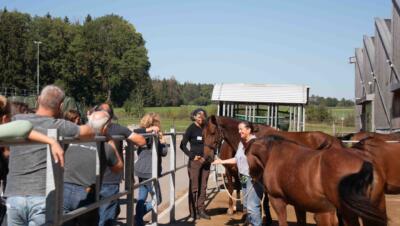
AgroVet-Strickhof at the Scientifica
What holds the world together? Come and find out at Switzerland's largest science festival, the Scientifica, where you can directly exchange with researchers and experience science first-hand.
The event takes place from 28. August to 3. September and is jointly organized by ETH Zurich and the University of Zurich. Also AgroVet-Strickhof is there. Find out more about Scientifica here: https://scientifica.ch/

Current trials at Strickhof in the area of cattle husbandry.
In 2017, the AgroVet-Strickhof dairy cattle barn in Lindau was newly occupied, followed by the young cattle and beef fattening barn in 2018. These new buildings are available to Strickhof, ETH Zurich and the University of Zurich for trials within the AgroVet-Strickhof cooperation. Trials are also being carried out on the Walchwilerberg in Früebüel, another AgroVet-Strickhof site. We would like to present a few selected projects in the first issue of the new year.
Use of motion sensors in behavioral research
Conducted by ETH Zurich, Animal Physiology Group
To improve animal welfare in livestock production, knowledge of social behavior is essential. Improving animal welfare reduces injuries and aggressive behavior, limits disease transmission, and promotes socially positive behavior. For example, it is possible to better identify "friendly" relationships and group these cows together during transports or groupings. This helps cows feel less stressed. To study cow interactions, the majority of research currently relies on in-person analysis of live observations or video recordings. However, this type of analysis is time consuming, labor intensive, and prone to error. This study aims to assess whether motion sensors can be used to evaluate social interactions in cows. This will provide insight into the potential uses of these sensors. The goal is to develop an automated assessment of social structure and dynamics of livestock that could optimize management of cattle.
Trials on methane mitigation in beef cattle farming
Agriculture produces over 80 percent of all methane emissions in Switzerland, 90 percent of which can be attributed to the digestion of cattle. In order to make cattle farming more sustainable, feedstuffs are continuously tested for their emission-reducing effect. At AgroVet-Strickhof, three trials are currently investigating methane reduction through different feed additives.
Reduction of methane emissions in grassland-based feeding with feed additives
Conducted by Strickhof, Animal Husbandry and Dairy Team.
In this trial, an industrial feed additive already approved for feeding was given to suckler cows. The feed additive has so far been tested mainly in combination with starch-rich rations. For optimal resource utilization, the integration of Swiss grassland into the feed is important, which is why grassland-based rations were fed to the suckler cows here. The feed supplement was investigated in a Hohenheim feed value test. The rumen juice of the test animals was used for this purpose. The already available results show an effect of the additive, as well as differences between the tested rations regarding methane emissions.
Effects of whey feeding on emissions from suckler cows
Conducted by Strickhof, Animal Husbandry and Dairy Team.
Whey is a cheap by-product of cheese production, which is available in surplus. In a study by Agroscope, the "Lactobeef" project, whey was able to inhibit methane emissions in beef cattle. At Strickhof, a project is taking place in which whey is being further investigated. Whey powder, whey concentrate and liquid whey from different cheeses are compared in their effectiveness. The emissions are measured in the respiration chambers of the AgroVet-Strickhof. The trial is currently in the data collection phase.
Trial to investigate feed additives and their emission reduction potential.
Conducted by ETH Zurich, Animal Nutrition Group
Author: Kaja Walter
Open position in the Head of Research Team
We are seeking a successor to represent the Vetsuisse Faculty and serve as Deputy Head of Research, starting in May 2023 or as agreed.
Further details about the position can be found here.
We look forward to receiving your application.
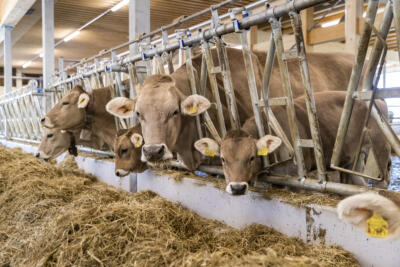
AgroVet-Strickhof Conference, November 7th 2023
Submission of abstracts
«Linking research and practice - with smart animal husbandry into the future»
The next AgroVet-Strickhof conference will take place on Tuesday, November 7, 2023 at AgroVet-Strickhof. From now on you can submit your abstract for the postersession:
The registration of the contributions will be done via your submitted abstract in English. In the download area you will find a format template (abstract) for the preparation in this regard. You can submit this to Andrea Weiss, andrea-weiss@ethz.ch, from now until May 31, 2023. Posters as well as abstracts must be written in English. Abstracts will be published in the Book of Abstracts and by ISBN number through the ETH Research Collection. Please note that for the presentation of the posters one of the Presenting Authors must be present in Lindau.
The aim of this event is to provide a common platform for researchers, students, practitioners and interested conference attendees for a lively exchanging of experiences. Also this year the conference is to be recognized as further education according to TSchV Art. 190. The approval for this is still pending.
We are looking forward to exciting contributions and hope to welcome you at this year's AgroVet-Strickhof conference. For any questions, please feel free to contact us by mail: andrea-weiss@ethz.ch.
Fathom the feed value of green alder
At Alp Weissenstein, a site of AgroVet-Strickhof, the green alder is studied in detail, because the strongly spreading shrub species is liked by the farm animals.
Land abandonment and scrub encroachment are a constant problem in the Swiss mountains. The loss of agricultural land and the decline in biodiversity are just two of the many consequences. The consequence is that invasive shrub species continue to spread on the unused mountain pastures. One of the most common of these species is green alder (Alnus viridis). As a nitrogen-fixing pioneer species, it can spread rapidly, changing pastures from a species-rich meadow to a species-poor tall shrub community with a dense canopy. However, in some pasture experiments on the alp it could be observed that robust cattle breeds as well as sheep and goats like to eat the leaves and sometimes also the bark of green alder. Therefore, an intensive study of this plant should provide a more detailed knowledge of the composition and forage value of green alder foliage in order to better understand vegetation dynamics in the context of grazing.
Reduce methane emissions
For this purpose, leaves of green alder shrubs were collected at four different times during the entire alpine season in two consecutive years. This was done not only on the Weissenstein alp, but also on three other alp sites in Switzerland and Italy, as this is a research project in collaboration between the Animal Biology and Pasture Systems Groups of Agroscope and the Research & Team Management of AgroVetStrickhof. With the collection of a total of 120 leaf samples as well as additional soil and weather data, one now has a sound data basis for analyzing forage quality over the growing season and across different weather conditions. After collection, the leaves were each examined in the laboratory and their forage value determined. In addition, an analysis of the bitter substances, the so-called phenols and tannins, was carried out. These are particularly exciting because it has already been scientifically shown that they are able to reduce methane emissions from animals to a certain extent when they enter the rumen of ruminants. What remains to be done is a detailed data analysis for an accurate interpretation of the collected data.
Study behavior of plants
Last year, an additional field trial (cooperation with the ZHAW and Agroscope) on the germination, establishment and competitive behavior of various plant species was set up on Alp Weissenstein. This trial is intended to improve seeding at high altitudes, in particular to improve the species richness of the final stand. For this purpose, selected species will be sown in groups according to their kei ming behavior and in different combinations in order to investigate their interaction. The coming alpine season will show how the plants develop. But now we have to be patient until the snow melts.

New Member of the Board of Trustees at AgroVet-Strickhof
Prof. Dr. Detlef Günther, former Vice President for Research at ETH and member of the Board of Trustees at AgroVet-Strickhof has resigned from his position and thus also as member of the Board of Trustees at AgroVet-Strickhof as of 31.12.2022.
Prof. Dr. Chrstian Wolfrum has been appointed as his replacement. He started as the new Vice President for Research and thus also as member of the Board of Trustees at AgroVet-Strickhof on 01.01.2023.
We wish Detlef Günther all the best and Christian Wolfrum a good start in his new function.
Colloquium «Applied Ethology»
On Tuesday, September 27, 2022, the colloquium "Applied Ethology", which has already become a tradition, took place for the sixth time at AgroVet-Strickhof, this time under the title "Handling as Refinement in Animal Experimentation". The event was organized as a cooperation between Edna Hillmann from the Humboldt University of Berlin, Carola Fischer-Tenhagen from the Federal Institute for Risk Assessment (BfR) and AgroVet-Strickhof. As in the previous year, participants were able to take part in the event both on site and online. Thus, participation was also possible for interested people from Germany. In total, we were able to welcome 42 people on site and 73 people online.
The organizing committee had put together an interesting program with six speakers. After an introductory presentation by Lorenz Gygax on questions concerning information on sample sizes and data evaluation in the application forms of the animal protection authorities, the following presentations gave a deeper insight into the respective fields of expertise. Thus, the participants learned from Nina Trimmel how a stress-free handling of sheep in animal experiments can look like. In the field of poultry, Sabine Gebhardt showed how an RFID tag can be used to track the individual behavior of laying hens in the barn and outdoors. After lunch, the topic of clicker training in livestock was introduced by Carola Fischer-Tenhagen, and the local participants gathered for the first time for a practical exercise in the metabolism barn, where some sheep from AgroVet-Strickhof had already been stalled for clicker training. Here the participants now had the chance to prove their skills as animal trainers, which one or the other already managed quite well. Most of them made the observation: it takes a lot of time and patience to train an animal to behave in a certain way, but such training has great potential for stress-free handling of animals in everyday research. After returning to the forum, Jennifer Meier presented on what makes a good animal trainer and the effect that good training can have on training success. Finally, Sabrina Briefer Freymond presented a study on the learning behavior of horses and their ability to associate abstract symbols with different consequences. Thus, participants at this year's colloquium were able to gain insight into animal handling in many different species.
The goal of the colloquium was to provide the participants with knowledge that will allow them to optimize the planning and framework of their experiments. An important part of the colloquium is also the informal exchange between researchers and animal handlers during coffee breaks and lunch. This is often an opportunity to refresh old contacts and make new ones, which are just as important for the researchers as the expertise imparted in the presentations.
We would like to thank all speakers for their presentations and the conference participants for their numerous contributions to the discussion and we are already looking forward to the next holding of the colloquium "Applied Ethology" on September 26, 2023.
Professor für Schweinemedizin geht in den Unruhezustand
Zeit für ein Adieu: Xaver Sidler, seit 2016 Professor für Schweinemedizin an der Vetsuisse-Fakultät der Universität Zürich, wurde diesen Sommer pensioniert. Am 30. Juni hielt der einstige Tierarzt aus dem Michel-samt seine Abschiedsvorlesung auf dem AgroVet Strickhof in Lindau. Rund 200 Personen wohnten ihr bei und liessen sich vom Referat des leidenschaftlichen Tiermediziners noch einmal so richtig in den Bann ziehen.
Nebst Studierenden hatten sich zahlreiche Gäste von Professor Xaver Sidler auf dem Strickhof eingefunden, um in angeregter Geselligkeit seiner letzten Vorlesung beizuwohnen. Nach einem ersten Apero begrüsste Roger Stephan, Dekan der Vetsuisse-Fakultät, die Gäste und verwies gleich auf Sidlers Werdegang: Von 1993 bis 2003 war er Teilhaber der Tierarztpraxis Ineichen/Küng/Sidler in «Gunzbu – für die, die das nicht verstehen: Das ist Gunzwil.» Als Quereinsteiger ist der aus dem Seetal stammende, in Rickenbach wohnhafte Tierarzt Xaver Sidler, damals an die Vetsuisse-Fakultät in Zürich gelangt. Ab 2005 leitete er die Abteilung für Schweinemedizin, 2013 habilitierte er und wurde 2016 Professor für Schweinemedizin. «Er war in Forschungsprojekten ein sehr weitsichtiger, verlässlicher Partner», so Roger Stephan. «Er ist und war ein Macher, ein Schaffer mit Visionen!» Der Dekan beglückwünschte Sidler zum kommenden «Unruhestand», was wahrscheinlich der richtige Begriff für ihn sei.
«One health» – Eine einzige, gemeinsame Gesundheit
Dann trat Xaver Sidler zu seiner letzten Vorlesung ans Rednerpult und gestand, er sei «wahnsinnig nervös». Aber «irgendwie werden wir das schon zu Ende bringen», meinte er, und begann: «One health – was ist das?» Und sofort war er im Element. «One health» bedeute das Zusammenspiel der Gesundheit von Mensch, Tier, Umwelt, Lebensmitteln und deren Produktion. Über alles gesehen, könne es nur eine einzige, gemeinsame Gesundheit geben. Dann führte er weiter zum Thema Antibiotika, jener infolge zunehmender Resistenzen «stumpf gewordenen Wunderwaffe», blickte um Jahrhunderte zurück in die Zeit der weltweiten Ausbreitung der Cholera und zog Vergleiche zur Gegenwart. «Zwei Drittel der Infektionskrankheiten sind tierischen Ursprungs. Über die Tierhaltungen werden Menschen auch mit antibiotikaresistenten Bakterien infiziert.» Sidler sprach engagiert, direkt und bodenständig – etwa über die Behandlung von Atemwegserkrankungen bei Schweinen. «Nasensalbe? Machen Sie das mal bei einem Schwein», referierte er, «also das macht wirklich keine Sau mit!» Deshalb habe man in der Forschung nach Lösungen gesucht, Infektionserreger mit Bakteriophagen zu bekämpfen, also mit Viren, welche Bakterien hochspezifisch angreifen können. Er erzählte enthusiastisch vom Feldversuch 2015, von anfänglichen Misserfolgen und dem Weitertüfteln, das schliesslich zum gewünschten Resultat geführt habe. «Vielleicht waren wir zu ungeduldig?», meinte er lachend, «das wäre ja typisch für mich!» Er zeigte auf, dass sehr viele Antibiotika durch Ausscheidung in die Umwelt gelangen. «Was heisst das für die Veterinärmedizin? Nur gesunde Tiere Liefern unbedenkliche Lebensmittel! Also Antibiotika so wenig wie möglich, aber so viel wie notwendig», resümierte er, und in Bezug auf seine Tätigkeit: «Als ich nach Zürich kam, konnte ich nicht erahnen, wie ungeheuer spannend diese Arbeit ist!» Er trug nicht nur heute ein T-Shirt mit der Aufschrift «I love pigs».
Vom Bauernbub zum Professor
Darauf gab Hans Wyss, Direktor vom Bundesamt für Lebensmittelsicherheit und Veterinärwesen, dem emeritierten Professor die Ehre und sagte zum Publikum: «Sie merken, dass er immer noch eine grosse Begeisterung hat! Diese hat er auch den Studenten weitergegeben.» Er nannte weitere Stärken von Xaver Sidler: «Erstens: Du bist seit 39 Jahren mit deiner Frau verheiratet.» Womit er wohl andeuten wollte, dass hinter jedem starken Mann eine starke Frau steht. «Und zweitens: Du hast deine Wurzeln erkannt und immer gespürt. Du konntest die Ärmel hochkrempeln und warst dir für nichts zu schade.» In anderen Worten: «Är hed Härd ade Schue gha!» Er, der als Sohn eines Kleinbauern weitab von Hohenrain, in den Siebziger Jahren sozusagen von der Scholle ans Gymi kam und, wenn nötig, vom Vater mit dem Trak-tor zur Kanti nach Beromünster gebracht wurde. Wyss machte noch einen weiteren, bildhaften Vergleich: «Du hast Brücken gebaut in allen Bereichen und konntest Gräben überwinden. Mit den Schweineproduzenten bist du gleich umgegangen wie mit den intellektuellen Akademikern.» Sidler habe vieles geleistet betreffend Antibiotikaresistenzen, und Wyss schloss seine Rede: «Xaver, du warst für den Veterinärdienst ein Glücksfall, aber als Mensch noch viel mehr!» «Ja, jetzt kommen mir wirklich fast die Tränen», antwortete dieser sichtlich gerührt.
Einen Gang runterschalten?
Des Lobes voll war auch der Christian Gerspach, Vorsteher des Departements für Nutztiere und Xaver Sidlers direkter Vorgesetzter. Er habe eine wichtige Zeit in der Schweinemedizin geprägt und über viele Jahre hinweg «one health» gelebt, ganz nach dem Grundsatz «Liefern, nicht lafern!». Meinrad Pfister, Präsident von Suisseporc, schloss sich an: «Schweinehalter wissen, was sie dir zu verdanken haben. Du warst einer von uns und nicht der Professor aus Zürich!» Als Vertreterin der Schweizerischen Vereinigung für Schweinemedizin SVSM machte Vroni Jeker einen unterhaltsamen Rückblick auf die gemeinsame Tätigkeit: «Wir hätten ja nie gedacht, dass du hier einmal als Professor landen würdest!» Xaver Sidler hörte nun sehr vergnügt zu, konnte mit verschränkten Armen zurücklehnen und geniessen. Vroni Jeker schloss: «Nun wünschen wir dir Gesundheit, geniesse deine Enkelkinder, und... schalte einen Gang runter!»
Ob der frisch Pensionierte dies tun wird? Wer ihn kennt, ahnt es: Wohl kaum. Es lockt schon eine neue Herausforderung in Kambodscha: Ein Versuchsstall zur Entwicklung eines Impfstoffes gegen die Schweinepest. «Dieses Projekt würde ich gerne begleiten», sagte Xaver Sidler, gedanklich schon wieder auf zu neuen Ufern. «Ich habe ja jetzt Zeit!»
Sprung ins Ungewisse mit beachtlichen Folgen
Nochmals bedankte er sich bei allen für die grosse Unterstützung. 2005, als er angefragt worden war zur Nachfolge von Professor Keller in Zürich, habe er gedacht: «Hey, die spinnen ja!» Der Wechsel an die Universität war für den Tierarzt aus dem Michelsamt ein Sprung ins Ungewisse, denn er war Praktiker mit Leib und Seele. Schweren Herzens habe er damals die Praxis in Gunzwil aufgegeben zugunsten der Universität, aber «eigentlich war meine Frau dafür verantwortlich.» Eben. Das Sprichwort bestätigt sich. Sidlers Engagement für Lehre und Forschung an der Uni Zürich ist beachtlich: Rund 1000 Studierende, 22 Schweinehalterkurse, 500 Vorträge und 19 FTVT-Kurse mit 2000 Teilnehmern. 44 Doktorarbeiten, 8 Master- und 3 Bachelorarbeiten betreut, 75 Pubmedgelistete, wissenschaftliche Artikel verfasst, 63 Posters an internationalen Kongressen. Unterstützung der Tierärzte im Feld, in der Fort- und Weiterbildung. Ja, die Lehre, also das «Salz in der Suppe», werde er vermissen, und auch die Forschung werde ihm fehlen, die für ihn stets hiess: Neugier befriedigen und Beiträge leisten zur Lösung gesellschaftlicher Probleme.
Keine Probleme, nur muntere Geselligkeit von Tierärzten mit viel Austausch unter ihresgleichen, gab es beim anschliessenden, zweiten und reichhaltigen Apero auf dem AgroVet-Strickhof. Eine Entourage Veterinäre aus dem Michelsamt und dem Seetal begab sich gutgelaunt und wohl nicht ganz ohne Stolz aufs Gruppenbild mit «ihrem» Xaver.
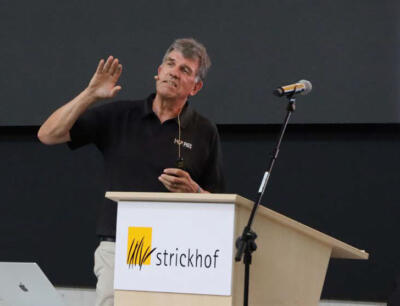
Fachabend "zukunftsorientierte Weideführung" - online
Am Fachabend "Zukunftsorientierte Weideführung" werden Ihnen verschiedene Aspekte der zeitgemässen Weideführung vermittelt. Dabei wird im ersten Teil ein Onlinevortrag stattfinden. Im zweiten Teil wird Ihnen praxisnah und an Beispielen aufgezeigt, was zukunftsorientierte Weideführung bedeutet und wie diese konkret umgesetzt werden kann. Der Kurs findet online via ZOOM statt.
Beef Fair Wülflingen
From Friday to Sunday we were present at the Beef Fair. The children could spend time at the methane cow. Soap bubbles came out of the cow, symbolizing the methane output after feeding. Other visitors took part in our quiz, where you could learn more about the research at AgroVet-Strickhof or trainings at Strickhof.
Blog Alp Weissenstein
Anna Dittli is managing the Alp Weissenstein of AgroVet-Strickhof this summer together with her husband Philipp, a Zusenn and a shepherdess. She will blog regularly about everyday life on the research alp in Bergün GR.
We look forward to working with them and wish them a good start.
All blog posts will be found here.
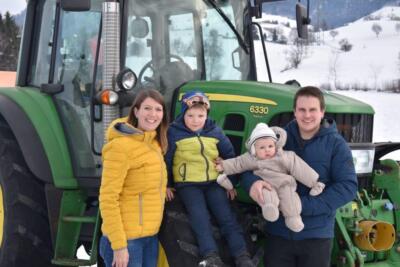
Beef.ch trade fair on the grounds of AgroVet-Strickhof Wülflingen
From June 24 - 26, 2022, the beef.ch fair will take place under the motto "Experience Beef". The fair offers the opportunity to exchange with producers, to taste the products of the labels as well as to get to know a selection of their cattle breeds.
AgroVet-Strickhof also has a stand together with Strickhof. Adults can learn a lot about AgroVet-Strickhof. There is also something for children.
We are looking forward to your visit. You can find more information here.
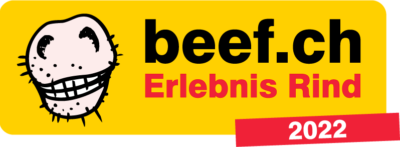
Strickhof Milk Day
Last Friday, the Strickhof Milk Day took place with 180 participants, organized by the Strickhof Animal Husbandry Team. At this training the participants could learn more about the Galt cow. Described as the "most important cow in the barn", the Galt cow was in the spotlight for a whole afternoon and its needs were examined from different angles.
The whole article can be found here.
Suisse Tier 2021
From 26th to 28th November 2021 the national trade fair for livestock "Suisse Tier" took place in Lucerne. The trade fair was the place for inspiration and information around the current topics of the livestock industry and especially for personal exchange.
AgroVet-Strickhof was also present as an exhibitor. Everything started with the set-up on Thursday. For the illustration around SmartFarming and current feeding trials, our lifelike cow was ready. The children enjoyed the milking or rather the "goosing" with water at the cow. Besides the research on cattle, current projects on pig health, pig farming and pig feeding were presented.
Monitors not only showed Lindau's facilities, but also drone footage of the four sites and a live feed into the dairy barn.
Last but not least, the visitors were able to get active themselves. In a discovery tour, they were allowed to answer various questions. Afterwards, young and old received a giveaway from AgroVet-Strickhof.
By the way, the next Suisse Tier will take place from 24th to 26th November 2023.
Pictures: Christoph Arnet, Text: Andrea Weiss
"Zukunftstag" at AgroVet-Strickhof
For the first time the future day took place on the 11th of November 2021 at AgroVet-Strickhof for 6 students under the guidance of Susanne Meese (Postdoc UZH, Group Assisted Reproduction).
We started at 8:30 in the morning, the first point of the program was the pigsty. We entered the farrowing pen and the first cries of "Jöö" came. The piglets in the pens with their mother curiously approach the visitors. The task was now to judge the piglet nests. Because the little ones like it cozy warm, namely 25-35 ° C. Conclusion after close inspection of the pupils - everything is in the best order.
After a short break, they went to the feed table of the dairy cows and took samples of the feed. Of course, the right feed is part of every animal husbandry. The students not only learned about the TMR (total mixed ration), but were also allowed to try their hand at weighing and calculating the fresh and dry matter.
The next station was the stables in the metabolism center. Here they examined the respiration chambers, which are used to measure the gas production (oxygen, carbon dioxide and methane) of various farm animals.
Then came the well-deserved lunch break in the Strickhof canteen, besides "Süssmost", a salad and a few pieces of pizza, there was even ice cream for dessert. Our 6 guests were thrilled. Freshly strengthened we went back to the cowshed - but this time to judge cows. Two cows of the breed Holstein Friesian and Brown Swiss were examined and compared with other animals from the herd. With eagerness the students were at work.
After a short afternoon break we took a look at the calves and the fattening munis. Thereby the different box systems could be discussed. Because at AgroVet-Strickhof, in addition to low & high boxes, a deep litter area is also available. Thus, we can choose the housing system depending on the requirements and research question.
Then it was the turn of our two milking systems. First we went to the tandem milking parlor. Here we were able to deepen what we had already learned - because the students already knew how to recognize ruminating in a cow and were able to observe this here as well. Afterwards, the milking robot of the training herd was marveled at.
After the work was done and they changed back into their everyday clothes, Luca, Simea, Aila, Lucia, Svea and Oona went home again, where they could surely tell about their exciting day with us at the AgroVet-Strickhof research station.
Recognizing trends and using them as an opportunity
At the AgroVet-Strickhof conference on 27.10.2021 current research results were presented and the challenges facing the industry were highlighted.
Under the title "Networking research and practice - agriculture of the future", speakers from AgroVet-Strickhof and renowned agricultural institutions gave an insight into the topics that are currently occupying agricultural production and development and will do so in the coming years. In his welcome speech, Ueli Voegeli, Strickhof director and chairman of the AgroVet-Strickhof management board, emphasized the potential of AgroVet-Strickhof as a joint educational and research institution in farm animal husbandry. He announced that the expansion of the pig barn into a new multifunctional education and research barn is planned, as well as the networking of AgroVet-Strickhof with plant production and breeding - in cooperation with ETH Zurich.
Research, education and consulting of central importance
The conference was kicked off by Christian Hofer from the Federal Office for Agriculture, who highlighted current trends such as population growth, climate change and increasing prosperity as challenges facing agriculture, while at the same time committing the industry to seizing the huge opportunities they present so as not to look like a loser. The trend toward a more climate-friendly diet with more plant-based foods will continue to intensify, he said - even if livestock farming will continue to have its place in Switzerland's grasslands. Agriculture is being called upon to produce more precisely and efficiently with the help of technological aids. To this end, institutions such as AgroVet-Strickhof are of central importance in order to generate and pass on the necessary knowledge through research, education and consulting.
Strong agricultural research in Switzerland
Martin Rufer, Director of the Swiss Farmers' Union, also gave Swiss agriculture good prospects. The high purchasing power of consumers who value Swiss origin and regionality are good prerequisites, he said. The sector could also benefit from an exemplary education system and, as a result, skilled professionals. The strong and practice-oriented agricultural research should be utilized, and the development of environmentally friendly production technologies or functioning alternatives to conventional crop protection products should be further promoted. Martin Keller, CEO of Fenaco, provided an insight into the economy. The cooperative is also on the move in the areas of innovation and sustainability, as evidenced by its just-announced cooperation with the World Food System Center of the Swiss Federal Institute of Technology (ETH) in Zurich and by its sustainability goals in its four business areas - agriculture, food industry, retail trade and energy.
Livestock feeding in transition
In response to the challenges and opportunities for agriculture formulated by the Federal Office and the Farmers' Association, researchers from AgroVet-Strickhof presented a series of current research results that meet the required developments in sustainability and also animal welfare. Katrin Giller from ETH Zurich presented her study on microalgae Spirulina as a possible "superfood" for livestock. She found that microalgae in the form of Spirulina could be an alternative protein source and thus substitute for soybean meal in the feeding of fattening males and dairy cows, although potential effects on animal health and offspring performance still need to be studied in more detail. Opportunities in feeding are also seen by Josias Meili of Strickhof, who showed in his presentation on contemporary feeding of dairy cows that Switzerland can add value compared to other countries, especially in feeding, for example by feeding certified soy or even soy-free and keeping concentrate use low.
Switzerland as a role model
Studies in the area of animal welfare and animal health were also presented. Because the keeping of sows in crates is to be abolished in several EU countries, the Swiss system, which has had experience in free farrowing for almost 15 years, is very much in demand. Problematic in free farrowing are the crush losses. Thomas Echtermann of the University of Zurich investigated whether total mortality is higher in free farrowing than in the crate system. In doing so, his study shows that while there are more crushing losses in free farrowing, there are fewer other causes of loss in piglets due to other factors. Xaver Sidler of the University of Zurich used the example of pig farming to present the challenges of animal food production, particularly with regard to antibiotic resistance.... The master's thesis of Philipp Egli from Strickhof also dealt with pigs. He investigated the regression of the uterus of mother sows after giving birth and the extent to which physical condition can have an influence on this.The tour of the AgroVet-Strickhof dairy barn and metabolism center gave conference participants a behind-the-scenes look at research activities. In addition - also with the poster sessions during the coffee breaks - the attendees were provided with a valuable platform for exchange and networking.
Text: Ursina Berger, Strickhof
The man setting out to reduce methane produced by animals
Michael Kreuzer, Professor of Animal Nutrition and pioneer in the prevention of greenhouse gas emissions from livestock, is retiring after 27 years at ETH Zurich.
Michael Kreuzer, with his white hair and white beard, speaks with an endearing Bavarian accent. He seems relaxed on this hot summer afternoon just a few weeks before his retirement. As he begins to talk, his eyes light up.
A shaky start in Zurich
It all began in 1994 when he moved from University of Göttingen to ETH Zurich as a young professor of animal nutrition. Michael Kreuzer had already given notice on his house and packed up the moving boxes designed to be moved to Switzerland when he received a fax from his future colleagues indicating that his new post as an ETH professor had been in jeopardy. Everyone in Zurich was worried that the ETH Board would not confirm Kreuzer’s appointment after all.
“Of course, I had no idea what was going on,” Kreuzer recalls. When it became clear that the hold-up was simply a dispute between the supervisory body and the president of ETH, Kreuzer was relieved. “Then things moved forward with my appointment as planned,” he says.
Soon enough, what started out as a nail-biter blossomed into a fruitful partnership for all parties. Kreuzer has been teaching and researching at ETH Zurich in the field of sustainable feeding of livestock, in particular ruminants, pigs and poultry, for 27 years.
The facilities of the research platform AgroVet-Strickhof, which includes a high-altitude site at Alp Weissenstein just below the Albula Pass, are his refuge. This partnership in the field of livestock research between ETH, the University of Zurich and the canton of Zurich was launched in 2017 after more than ten years of planning. Kreuzer was one of its visionaries and was closely involved in the project. The heart of the project is the Metabolic Centre, where research is conducted on the digestion and energy utilisation of livestock.
More climate-friendly cattle
Kreuzer was one of the first scientists to seriously explore the question of how to reduce the emission of the climate-damaging methane from ruminants. Bacteria break down plant fibre in the rumen of cattle, sheep and goats. “A by-product of this is hydrogen, which the animal has to dispose of,” he explains. Primordial methanogenic microbes do this by producing methane from hydrogen and carbon dioxide, which the ruminant then expels through its mouth.
“The aim is to inhibit methane formation without inhibiting digestion of the fibre,” says Kreuzer. He pretty much knows every trick in the book in this respect. His first experiment at ETH was a big moment when he discovered that coconut oil can reduce methane by up to 70 percent. “That was a huge deal at the time,” he chuckles. However, since coconut fat is sourced from the tropics, it is not practical for cows in Switzerland.
Since then, his group has developed a variety of methods to reduce methane. The focus has always been on natural additives to the grassland-based feed normally used in Switzerland. “Switzerland is a grassland country and should require very little additional concentrated feed,” he says. Linseed, which also improves the quality of the milk fat, and hazel leaves, which contain tannins, have proven to be effective in reducing methane. Garlic, on the other hand, achieved little – and smelled terrible. The researchers tested the effectiveness by analysing the gaseous exchange of the animals in special respiration chambers.
From outsider to luminary
Kreuzer’s research initially received little attention. This changed in 2007 when a report published by the International Panel on Climate Change (IPCC) brought the problem of methane from livestock agriculture to the public eye. Since then, the interest in his work has continued to grow. Today, Kreuzer is a highly respected specialist in climate-friendly feeding systems and a sought-after expert by the media.
But it was never his goal to be in the media spotlight. Kreuzer is understated by nature – particularly when talking about himself. He is too modest for that and prefers being with the animals or writing scientific publications.
In his view, the way in which cows are constantly described as climate killers in the media misses the mark: “It’s not cows that are the problem; it’s the people who are raising too many cows.” Today everyone wants quick answers and simple solutions, he says, but it is necessary to approach the problems in a differentiated way.
Considering the system as a whole
Feed additives are not the only thing occupying Kreuzer’s thoughts. As a researcher, he is interested in the diversity of interactions between plants, animals and the environment. This is why he also examines system-oriented questions related to the feeding of animals and the global food supply. “In many countries, the goal is to give livestock more concentrated feed, as replacing fibre with starch reduces methane emissions,” he says. But then feeding animals competes directly with feeding humans, which ultimately may enhance famine, overfertilisation and deforestation. “There are no simple solutions, but this fact is difficult to convey.”
This is why the group is working on research into new types of feeding systems, such as insect protein produced through food waste, that can replace soy in poultry feed. More recently, there have been ethically motivated projects, including dual-purpose chicken types and the fattening of male layer-type chicks – two alternatives to the questionable killing of day-old male chicks hatched in the farming of laying hens. Many of the studies of his group have focused on animal welfare and the quality of meat, milk and eggs.
«Livestock is treated much like electronic gadgets – they are replaced after just a short time, even though they still work well.» Michael Kreuzer
One issue that particularly concerns him is the lifespan of dairy cows, which need two to three years before they can produce milk. The longer they live, the less methane-intensive their milk becomes. “But our cows are living shorter and shorter lives,” Kreuzer explains. This is also because dairy cow meat ends up mainly in burgers, and rising demand from burger chains is driving up the price of the meat, giving farmers an incentive to slaughter their dairy cows earlier. “So livestock is treated much like electronic gadgets – we replace them after just a short time, even though they still work well and keeping them alive would be better for the environment,” says Kreuzer regretfully.
A researcher with a friendly leadership style
Kreuzer studied agriculture at the Technical University of Munich-Weihenstephan and earned his doctoral degree in animal nutrition. He benefited professionally from his doctoral advisor, but struggled with his authoritarian leadership style. “I decided then that in my own future I would do it differently in that regard,” he recalls.
According to his colleagues, he succeeded: Kreuzer is known as a most pleasant colleague, friendly partner and supportive boss, who attaches great importance to humility, integrity and respect for other people.
At the most recent spring conference, Kreuzer’s team showed a surprise video of employees, colleagues and partners from all over the world expressing their gratitude with a bit of humour. “This appreciation was very touching,” says Kreuzer. It was also confirmation that his genial style had been the right path.
What comes next remains to be seen
Now the veteran methane-fighter is retiring. He leaves his successor Professor Mutian Niu a legacy of a booming field of research and motivated colleagues. “Industry and other scientists are more eager than ever to collaborate,” says Kreuzer.
A transition period is now beginning for him: he will continue to give his favourite lecture on the quality of animal products for another two semesters. He will also continue to spend days at AgroVet-Strickhof. For the time being, he does not have any grand plans, as his wife will continue to work for another five years: “Then we will have to see, together, what comes next.” At any rate, he plans to acquire a few geese. Or chickens. One thing is certain: «We will stay in Switzerland, as it’s the home base for us and our two adult children.»
Farewell lecture
Michael Kreuzer, ETH Professor of Animal Nutrition, gave his farewell lecture Die Schweiz (besser) ohne Nutztiere? (in German) on Wednesday, 22 September 2021. Those who were unable to attend the farewell lecture can watch the recording here.
More information is available here.
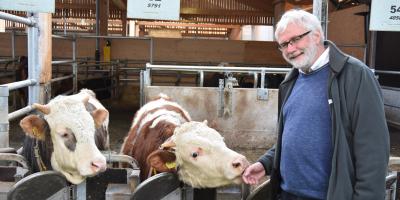
Colloquium "applied Ethology"
On Tuesday, September 7, 2021, the colloquium "Applied Ethology", took place for the fifth time at AgroVet-Strickhof. In order to be prepared for different scenarios regarding the development of the COVID-19 situation, the event was planned as a hybrid event with both on-site and online participation. Fortunately, on-site participation was possible without any major restrictions. The head of research at AgroVet-Strickhof, Melissa Terranova, was able to welcome 30 people on site and 14 people online.
The head of research and team of AgroVet-Strickhof had put together an interesting program with seven speakers. After a longer introductory presentation on important statistical principles for experimental work with animals, the following presentations gave a deeper insight into the respective fields of activity/research. The participants learned how to find genetic causes for sperm defects in bulls. The testing and approval procedure for housing facilities was presented and examples were used to show which aspects of a housing system are important with regard to animal welfare. After lunch, it was presented what calves need to have healthy cows later on and how to assess animal health and welfare in poultry. The afternoon was concluded with a presentation on the use of sensor technology in the livestock sector and what is still needed until smart farming is really smart, as well as a contribution on the broad spectrum of research possibilities at AgroVet-Strickhof. These range from in vitro systems to on farm experiments. After each presentation there was time for questions and discussion. This opportunity was used intensively by both on-site and online participants.
The goal of the colloquium was to provide the participants with knowledge that they can use to optimize the planning and framework of their planned experiments. An important part of the colloquium is also the informal exchange between researchers during the coffee break and lunch. This often includes the exchange of important experiences and the establishment of contacts, which are often just as important for the researchers as the specialist knowledge conveyed in the presentations.
We thank all speakers for their presentations and the conference participants for their contributions to the discussion.
Note: Next year's colloquium will be held on Tuesday, September 27, 2022.
Livestock farming research of the future
Which feed additives can be used to reduce emissions of climate-damaging methane in ruminants? And how is the performance of laying hens and the quality of their eggs affected if soy is replaced in the feed by insect larvae meal and fat? Whether it is more climate-friendly cattle farming or soy substitution in the feed ration: at AgroVet-Strickhof Education and Research Center, intensive and practical research is being conducted into innovative solutions for making livestock farming more sustainable.
A total of 44 trials were processed in 2020 by the management and the Head of Research at AgroVet-Strickhof. The focus of research activity was primarily on cattle, followed by sheep, pigs, poultry and horses. Based on the research work at AgroVet-Strickhof, 40 original papers and review articles were published in scientific journals last year, and results were presented at conferences in 42 papers.
Research and education
AgroVet-Strickhof is not only a place of research, but also a place of education and training for veterinary and agronomy students, agricultural trainees and practitioners. To complement the theoretical lessons in the vocational school, the stables in Lindau and in Wülflingen are regularly visited by the teachers of Strickhof as well as other agricultural schools from Switzerland and abroad with the trainees. In this framework, in 2020, despite Corona, more than 500 students have carried out exercises on various topics such as CH-TAX, linear description, milking, hygiene and animal observations, or even learned to measure a barn correctly.
Side modernized
In 2020, the renovation or expansion of the Früebüel research station was completed. An old barn was expanded with a free stall barn for suckler cow husbandry, and the former dairy cattle barn was converted into a shaft barn. The laboratory infrastructure was further modernized and expanded to allow researchers to process and analyze sample material directly on site. "The facility fully meets our requirements to advance livestock research in Switzerland," says Melissa Terranova, Head of Research at AgroVet-Strickhof. The new facilities at Früebüel will be used for research on rearing cattle, suckler cows, sheep and fallow deer.
Agriculture of the future
On October 27, 2021, the second AgroVet-Strickhof conference will be held. "Networking research and practice - agriculture of the future" is the theme. Exciting lectures around current challenges and research topics in agriculture will be discussed here.
AgroVet-Strickhof Conference 27.10.2021
Submission of abstracts
We would like to inform that the deadline for submitting abstracts for the AgroVet-Strickhof conference is extended to the end of June 2021. Please find the word template in the download area.
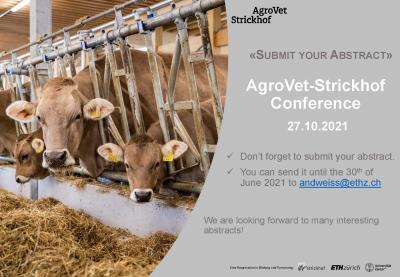
Exciting abstracts have already been submitted. Now we hope and look forward to receiving more interesting abstracts. For any questions, please feel free to contact us by mail: andrea-weiss@ethz.ch.
the OK Team
150 years of agricultural sciences ETH Zurich
The Institute of Agricultural Sciences of ETH Zurich celebrates its 150th anniversary. In the video, a tour of the Institute of Agricultural Sciences is shown, in which AgroVet-Strickhof is also presented.
Katrin Giller, senior assistant in the research group for animal nutrition, gives an insight into the current research priorities in the research facilities of AgroVet-Strickhof (from minute 39 and following). In it, she explains, among other things, how the production of methane emitted by cows can be measured and also reduced.
Learn more about AgroVet-Strickhof in the following short video:
New Professor of ETH Zurich at AgroVet-Strickhof
Prof. Dr. Michael Kreuzer (*1956), currently Full Professor of Animal Nutrition in the Department of Environmental Systems Science at ETH Zurich, is to retire at the end of July 2021.
Prof. Dr. Mutian Niu (*1989) has now been appointed by the ETH Board to replace Prof. Dr. Michael Kreuzer. He intends to start on June 1, 2021. The article can be found in the ETH News section.
He is currently Assistant Professor at the University of Pennsylvania, USA, as Tenure Track Assistant Professor of Animal Nutrition in the Department of Environmental Systems Science. Mutian Niu’s main area of research lies in quantifying and reducing environmentally relevant emissions from livestock farming, and is of considerable help in making the sustainable production of animal source foods more socially acceptable. His professorship is attached to the AgroVet-Strickhof Education and Research Competence Centre and will make a substantial contribution to this cooperation between ETH Zurich, the University of Zurich and the Canton of Zurich.
We look forward to working with Prof. Mutian Niu and wish him a successful start.
AgroVet-Strickhof conference 27.10.2021
Submission of contributions
the second AgroVet-Strickhof conference is planned to take place on the 27th October 2021 as an online event. The topic of this year's conference is "Networking Research and Practice - Agriculture of the Future". You can submit your contributions for the poster session from now on.
The registration of the contributions will be done via your submitted abstract in English. you can find the template in the download area. You can submit this from now until May 31th to andrea-weiss@ethz.ch. Posters as well as abstracts must be written in English.
The aim of the meeting is to provide a platform for researchers, students, practitioners, and interested conference attendees for a lively exchanging of experiences.
This conference will be held online due to the Covid-19 situation. Should the pandemic situation ease by October 2021, a hybrid option with the possibility of on-site and online participation will be considered. Online participation will be free of charge. If the conference will take place on-site, with your submitted contribution, the conference and the catering will be free of charge.
We are looking forward to exciting contributions and hope to welcome you at this year's AgroVet-Strickhof conference. For any questions, please feel free to contact us by mail: andrea-weiss@ethz.ch.
the OK Team
AgroVet-Strickhof conference / Save the Date
Due to the Corona pandemic we have to postpone the planned AgroVet-Strickhof meeting from January 2021.
The conference will now take place on Wednesday, 27.10.2021 in the AgroVet Forum in Lindau.
Please reserve this date in your agenda already today.
The Conference Organisers are working on preparations and more information will be provided in February 2021 as well as details on how to submit abstracts.
We are already very much looking forward to the conference and hope for numerous participants and exciting presentations.
Yours sincerely
Head of Research and Team
AgroVet-Strickhof looks back on two successful years.
The first two years of AgroVet-Strickhof were dominated by intensive research and educational activities.
AgroVet-Strickhof, the education and research center for farm animals, looks back on two successful operational years. The cooperation Strickhof, ETH Zurich and the University of Zurich has grown closer together and is setting new standards in research and education. The figures speak for
itself: In 2018 and 2019, more than 40 scientific articles were published annually. The young scientists were equally successful in presenting their projects at numerous symposia in Germany and abroad (50 in 2018, 92 in 2019). No less spectacular were the training and further education courses for future veterinarians, agricultural students and agricultural pupils as well as practitioners. The focus was mainly on cattle: lactation physiology, pregnancy testing, linear description and courses on hoof care, to name but a few. But the horse is also part of the training. The grooms in training could, for example, try out the anatomy and the application of bandages in Lindau. The head of research and the team have their hands full, as the 137th research project has already been submitted and processed from the opening until the end of 2019. In addition to the organizational issues in the laboratory, the execution of the experiments must also be coordinated with the company. The accommodation and care of the animals during the implementation of the research projects must be well thought out and prepared. Research projects on animal health as well as feeding experiments on methane reduction and replacement of soya in rations in agricultural livestock have been successfully completed. Research projects on stable floor renovation, digitalization and liquid manure experiments are also in the portfolio. In addition to day-to-day operations, the research management and the team are also working on other projects. The finalization of the conversion in Früebüel was approached in a structured and successful manner as well as specific construction measures in the Metabolism Center. For example, technical adjustments were made to the respiration chambers for keeping of fattening cattle, breeding sows and fattening pigs, as well as the installation of an automatic feeding system including silos for pig farming. In order to be able to produce specific test feeds on site, AgroVet-Strickhof has also been registered as a feed manufacturer and follows the strict specifications for feed production, as it is also the case with feed mills. Numerous guided tours (2018: 90; 2019: 68) indicate great interest in the new campus in Lindau. In recent years, almost 7,000 people have visited the campus. The two major events, the Swiss Cow and the AgriTechDay, were the most well attended (approx. 800 and 1,500 visitors respectively). In addition, many participants of further training courses took the opportunity to have the experts explain the stables to them after the course, which often led to exciting discussions that clearly showed the need for practice-oriented research. It remains exciting for AgroVet-Strickhof and also in the Corona year 2020 training and research will continue to be successfully carried out, although in a different way than usual.
AgroVet-Strickhof
The AgroVet-Strickhof education and research center, operational since 2018, is a cooperation between Strickhof, University of Zurich and ETH Zurich. It is a place where university teaching, agricultural education and training and research are closely interlinked in a unique way. At AgroVet-Strickhof, scientists and practitioners work hand in hand with the aim of gaining insights into how animal welfare and sustainability in livestock farming can be promoted. Under the approach "From Feed to Food", questions from the fields of livestock science, animal health, digitalization and smart farming are approached in an interdisciplinary, practical and holistic way. The possibility of conducting training and research on farm animals and flora at three levels of altitude is a major advantage of AgroVet-Strickhof and is unique worldwide, because AgroVet-Strickhof extends over the four operating sites of Lindau (ZH), Wülflingen (ZH), Früebüel (Walchwil ZG) and Alp Weissenstein (Bergün GR).
Colloquium "applied Ethology"
On 22 September 2020, the colloquium "Applied Ethology" was held for the fourth time at AgroVet-Strickhof. This year we were able to welcome 50 participants in the forum and some online. Due to Covid19 situation, the number of participants was limited. The majority of the participants were researchers from the three cooperation partners of AgroVet-Strickhof (Strickhof, UZH, ETH), but teachers and consultants as well as employees of other institutions were also present.
Eight speakers could be won for this event, who gave an insight into their respective fields of research. Some of the presentations focused on the animal species kept at AgroVet-Strickhof. The participants were given knowledge about the behaviour of the animals that are part of their research. Furthermore, tools were presented with which the behaviour and health of the animals can be assessed and classified. The use of these tools can on the one hand help to improve the general conditions for the investigations, to keep the animals as optimal as possible and on the other hand to improve the interpretation of results. Furthermore, different applications of infrared spectroscopy in milk and in vitro techniques were presented. In the future, infrared technology could allow researchers to screen a large number of animals or treatments in accordance with the 3 R principle without having to keep the animals under special research conditions. Thus, a pre-selection of animals or treatments can easily be done in advance and only a selected animal population needs to be kept under research conditions. Another possibility to do research in the sense of the 3Rs principle was discussed in the lecture on in vitro methods in animal nutrition. With the presented in vitro techniques many different feed substances can be screened for their effects on the animal. Substances whose influence on the animal's digestion is still completely unknown can also be tested without having to accept undesired, unexpected consequences for the animal. A section to statistics is also a must at such an event. Taking into account the essential statistical principles, researchers can plan their experiments correctly and then interpret the results correctly using the correct evaluation methods. All in all, the participants received exciting presentations followed by time for questions and discussion.
We would like to thank all speakers and conference participants for their presentations and contributions to the discussion and look forward to the next colloquium "Applied Ethology" in September 2021.
AgroVet-Strickhof, Team Head of Research
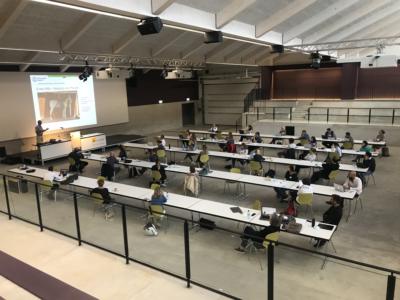
Corona Update
Dear AgroVet users
Since mid-August, the buildings at AgroVet-Strickhof have again been open to the public. To prevent critical health situations from arising in the public areas, a mask is mandatory in the buildings when moving from one place to another - even on short distances.
The mask obligation does not replace the distance rule. Whenever possible, a distance of 1.5 meters must be maintained.
Thank you very much for your commitment and understanding.
Stay healthy!
Your head of research and team
Handing over the keys at Früebüel
The renovation and extension of Früebüel (Canton of Zug) research station has been completed. AgroVet–Strickhof now has four state-of-the-art research and higher education facilities for the agricultural sciences.
Despite the coronavirus lockdown, the renovation and extension of Früebüel research station in Walchwil (Canton of Zug) was completed nearly on schedule. AgroVet–Strickhof, a research cooperative supported by ETH Zurich, the University of Zurich and Strickhof, now has state-of-the-art research and higher education facilities at its four locations.
People seeking relaxation on the Zugerberg mountain in Switzerland will have already noticed it: there have been big changes at Früebüel, a former farm. AgroVet–Strickhof, a platform for research and higher education in agriculture, joined forces with ETH Zurich to renovate and expand its barns, operational buildings and wild animal enclosures over the past two years. Now, almost three years after obtaining building permission from the Canton of Zug, the construction work is complete.
Früebüel’s new facilities will be used for research on breeding cattle, suckler cows, sheep and fallow deer. The expanded AgroVet–Strickhof location is operated by cooperation partner Strickhof. At 1,000 metres above sea level, Früebüel is particularly suited to investigating specific issues connected with farming operations in the Alps and alpine foothills. In the summer, the animals are moved to graze on Alp Weissenstein on the Albula Pass (Canton of Graubünden), which is also an AgroVet–Strickhof research location.
Research here is conducted primarily by AgroVet–Strickhof’s cooperation partners, especially ETH professors in the animal sciences, plant ecology and grassland sciences. Those in the latter department have been operating a measurement station at Früebüel since 2005; one project records material flows including greenhouse gases from grassland subjected to medium-intensity use.
Location allows for more intense research
“We’re thrilled to be able to continue and expand our research in this modern and spacious facility,” says Melissa Terranova, AgroVet–Strickhof’s Head of Research since 1 April 2020. “It has everything we need to drive livestock research in Switzerland.” Thanks to the extension of the location, she continues, research can continue at a greater intensity.
Ulrich Weidmann, Vice President for Infrastructure at ETH Zurich, is also happy about the completion of construction. “We’re delighted to be finished with this challenging project,” he says, “which marks the end of the extension programme for the AgroVet–Strickhof cooperative. Now we can hand over operations of this location to the AgroVet–Strickhof management team.”
ETH’s Real Estate Management department was in charge of planning and implementing the construction work. Planning and building costs amounted to about 13 million Swiss francs.
Major support from the local commune and canton
“I wish to thank the commune of Walchwil, the government and administration of the Canton of Zug, and the associations involved for their excellent cooperation,” Weidmann continues. “Without their terrific support, we would never have been able to bring Früebüel up to the standard necessary for first-class research.”
New wildlife enclosures and modernised labs
Most of the construction consisted of renovation and extension work: a freestall for suckler cows was added to an old barn and the former dairy barn was turned into a sheep barn. Modernisation and extension efforts also focused on the laboratory infrastructure so that researchers can process and analyse samples directly on site. A winter shelter with spacious pens was built for fallow deer, as well as an outbuilding with a fire brigade depot “Berg” for the commune of Walchwil.
Ecological offsets on a 1:1 scale
ETH Zurich provided ecological enhancements on the Früebüel site to offset the space enclosed by the new pens. For example, it applied extensification to wetlands and planted new hedges and ecologically diverse border zones. In addition, 300 metres of forest border were extensified. All of these connecting elements serve as a corridor for wild animals and add up to a total of 4.5 hectares.
Research focuses on livestock
“Research here focuses clearly on livestock science and its place in sustainable agriculture that has been adapted to its location,” explains Susanne Ulbrich, Professor of Animal Physiology at ETH Zurich. For example, the researchers investigate how feeding the animals impacts their metabolism, testing Schwarzbraunes Bergschaf sheep and Swiss Original Braunvieh suckler cows.
Ulbrich herself is heading a study on roe deer. These ungulates are only rarely kept and studied in enclosures. She is particularly interested in the roe deer’s phenomenon of embryonic diapause, or delayed implantation. “If we knew more about this special process, we would be better positioned to understand fundamental development processes in livestock,” Ulbrich explains. “We investigate what embryos need for healthy development. We’re also looking for new parameters that will differentiate healthy stress from the type of stress that harms the animals.” In addition to the physiological studies, the researchers conduct behavioural studies as well.
All studies with animals are carried out in compliance with strict animal welfare guidelines. Every study first has to be approved by the canton’s veterinary office.
Unique approach
Terranova points out that the higher education and research that AgroVet–Strickhof conducts at Früebüel is of national and international interest: “Besides AgroVet–Strickhof, Switzerland has neither university-level education nor research that is directly connected with career training and agricultural practice. This one-of-a-kind collaboration thus plays a crucial role,” she says.
Open days in 2021
Due to the coronavirus pandemic, AgroVet–Strickhof will be unable to celebrate the opening of the Früebüel facilities this year. Currently, plans are to officially open the location as part of an open day in 2021, but the exact date is still to be determined.
Further information
Background https://www.agrovet-strickhof.ch/standorte/fruebuel-walchwil-zg
Project https://www.agrovet-strickhof.ch/ueber-uns/geschichte/geschichte-projekt-fruebuel
Contact
For research on the Früebüel and generally AgroVet-Strickhof:
Melissa Terranova, Head of Research AgroVet-Strickhof; Tel.: +41 52 354 91 37, Mail: melissa-terranova@ethz.ch
About the construction:
Bianca Gasser, Head of Communications, Real Estate Department ETH Zurich; Tel.: +41 44 633 82 44, Mail: bianca-gasser@ethz.ch
Download as PDF
Coronavirus
Dear AgroVet-Strickhof users
Due to the rules set by the Federal Council based on the current developments, ETH Zurich, the University of Zurich and Strickhof have decided to switch to emergency operation from Tuesday, 17 March. This also has consequences for the operation of AgroVet-Strickhof. The following rules apply immediately:
- All buildings are only accessible with the badge
- On the area may be present only people who must be here (animal care, ongoing trials)
- The group or team leaders decide which selected persons may stay on site; everyone else should stay at home.
- Anyone who is required to be on site must comply the hygiene measures from the BAG (personal hygiene measures, distance between each other, …)
- Physical contact must be reduced to a minimum, please use Skype or Zoom for meetings.
- From ETH side, all non-mandatory laboratory analysis should be postponed until the resumption of normal operation (provisionally planned for the end of May)
- For your information: the facility management staff is only occasionally on site and the company paramedics are no longer on duty (due to home office at Strickhof)
- All telephones in the EHB (office and laboratory building) that are activated for external calls can now be forwarded to private Swiss telephone numbers (mobile and fixed network)
The declared goal is to reduce the spread, this protecting the staff of the A+V-Betrieb (Farm team), as they have to ensure the care of the animals!
The Research management will be represented by one person per day to assist in emergencies and to receive deliveries.
- Monday: Raphael Jendly, 052 354 92 03
- Tuesday: Hans-Ruedi Wettstein, 052 354 91 56
- Wednesday: Susanne Meese, 052 354 91 60
- Thursday: Melissa Terranova, 052 354 91 37
- Friday: Sergei Amelchanka, 052 354 92 02
We will keep you updated.
Stay healthy! Sincerely yours
Head of Research and Team
Tier&Technik 2020 - 20th International Trade Fair for farm-animal husbandry, agricultural production, special crops and agricultural engineering
At this year's trade fair from 20th to 23th 2.2020 you will find know-how, top-class animal exhibitions and a wide range of products for the modern agriculture. AgroVet-Strickhof will also be there, visit us at our stand together with Strickhof Lindau 1.0.17.
Click here for the link:
https://www.tierundtechnik.ch/de/

AgroVet-Strickhof - not only research and education but also sporty challenges in daily life
On January 29th 2020, 16 sportsmen and women started again at 7 pm. Team members came from seven nations, a real international sport event under the coaching of Dani Schär! The matches took place in doubles and then in singles. The players showed their enthusiasm in the knock-out round and at the end there was an exciting final between ETH and Strickhof employees.
First AgroVet-Strickhof Conference
As already announced in November 2018, the first AgroVet-Strickhof conference will take place on 1 July 2019. Learn more about the current and planned research work and exchange ideas with the authors and researchers in personal conversations.
When? 1 July 2019 from 09:00 to 16:00 o'clock
Where? In the Forum at the AgroVet-Strickhof, Eschikon 27 in 8315 Lindau
You can find the program here: PDF (GERMAN)
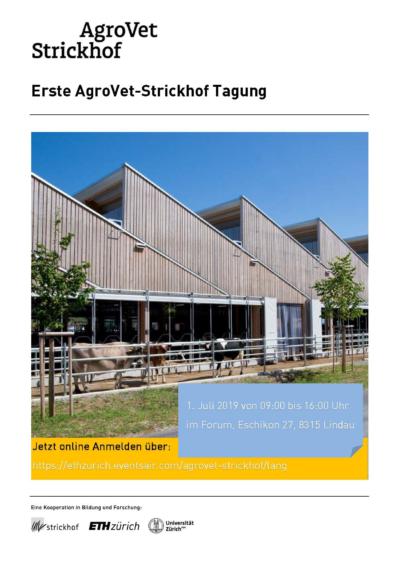
Agriculture of the Future – digital and sustainable?
AgriTech Day
AgriTech Day is a field day for young and old. Learn how modern science and technology can lead to sustainable solutions for Swiss agriculture. Exciting projects, demonstrations, and presentations await you on the fields in Eschikon. By participating, you can gain surprising insights from agricultural research and find out how resource-efficient and environmentally-friendly agriculture of tomorrow can look. Come and exchange ideas with our researchers!
Saturday, 25 May 2019
10:00 - 17:00
ETH-Research Station for Plant Sciences, Strickhof & AgroVet-Strickhof
Eschikon 27, 8315 Lindau
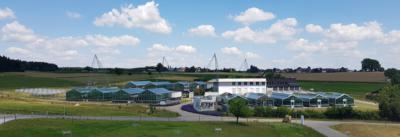
This innovative event is a collaboration of ETH Zurich, Strickhof and AgroVet-Strickhof.
More environmentally friendly cows
Bovines eat a lot of soya and are the big emitters of greenhouse gases and the air pollutant ammonia. New feed additives for ruminants and an innovative cow toilet will help. >> open Article in PDF
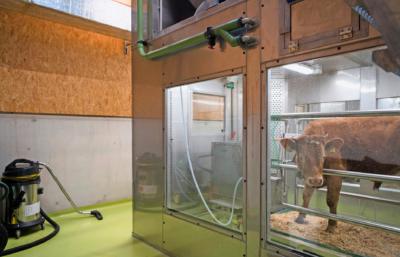
Read the article online: https://www.tagesanzeiger.ch/wissen/natur/kuehe-sollen-umweltfreundlicher-werden/story/27598855
Spring Conference 2019 «Big Data and Smart Livestock Farming»
On Tuesday 16 April 2019, the spring Conference of the Swiss Association of Animal Sciences (SAAS) will take place at AgroVet-Strickhof in Lindau. The topic of the conference will be «Big Data and Smart Livestock Farming». In addition to the lectures on the conference topic, there will be poster presentations on current research work in the field of animal sciences. Further information regarding the conference and the registration of poster presentations can be found on the SAAS website: http://www.svt-assa.ch/svt-tagungen.html
«Young and Beef Cattle Barn AgroVet-Strickhof» opening and stabling
October 4th 2018 not only promised to be a sunny day, it was a milestone. The employees of the Eschikon Campus were able to explore the new young and beef cattle barn. Following the guided tour, there were many exciting talks and discussions about possible projects and new goals during an aperitif. But before that, Joël Bérard, Head of Research AgroVet-Strickhof, welcomed the guests from research, education and service. "AgroVet-Strickhof is like a living creature that constantly re-shapes and thrives to meet the needs of education, research and production," says Bérard. Andreas Rüsch, Strickhof Vice Director and Head of Agricultural Advisory Service, was also very pleased and thanked all those who were involved for their commitment on behalf of the Strickhof management in order to reach a successful finalization.
AgroVet-Strickhof celebrated its opening in September 2017, since then was repeatedly filed and screwed to other stables and animal shelters, so that a staggered commissioning could take place. Because research and education cannot wait. Therefore, the students could already use the existing possibilities extensively. Due to the successful completion of the last major construction phase, another milestone has been achieved, but this did not always seem so certain. Without the great commitment of Hanspeter Renfer, Head of Farm Operation, who literally used screws and fasteners at the very last minute, this would not have been possible.
Therefore, it was also a special moment for him to guide the invited guests through his new barn and explain the group housing in the deep litter system as well as the high and low box system. Further, he was able to lend the special construction measures to the eager listeners, because this stable is built to the standards of an experimental animal husbandry. Moreover, there are individually programmable gates for the beef cattle, resulting in monitoring the feed intake. In addition to the needs of agricultural production, this barn must also help scientists to answer their research questions.
Already on October 8th, 2018, the first animals moved into their new home and quickly found their way into their new environment. Within a short time the animals learned to find their own feeding place and to open the gates with ease. The first project in the new stable started at the end of October. The doctoral thesis of Magdalena Kurrig (ETH Zurich) will investigate possible feeding strategies for the environmentally friendly and efficient production of high-quality beef under Swiss production conditions. These and other questions will be clarified at the new AgroVet-Strickhof Competence Center in order to contribute to livestock research.
Pictures and Impressions
Swisscow 2018
On Sunday 28 October 2018 Swisscow took place at the AgroVet-Strickhof in Lindau ZH. In the fourth edition, Swissherdbook awarded 375 farms with outstanding management and/or exceptional breeding cows.
>> Link to the article in «Schweizer Bauern»
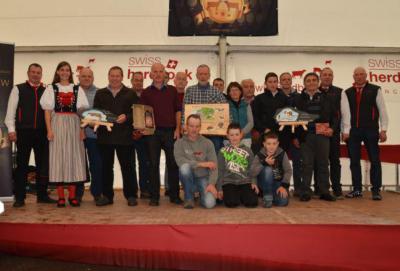
3sat informed about AgroVet-Strickhof, the special farm
On Monday, 27th August 2018 3sat informed 3sat within the program «nano» about AgroVet-Strickhof in German.
This program gives a good overview about the work and the goals by AgroVet-Strickhof.
>> Link to the video in German
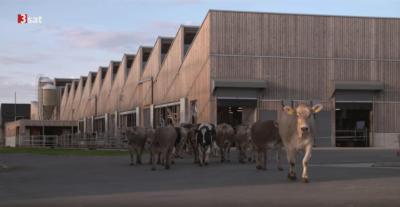
Susanne Meese new employee since August 2018
Beginning August 2018 started Susanne Meese her activity as Projekt Leader by AgroVet-Strickhof, Head Research and Team.
We cordially welcome Susanne Meese in our team and we look forward to the collaboration.
Start of construction on Früebüel in July 2018
After the building application was approved end of 2017 the construction work will start in July 2018.
Open days on 2. and 3. September 2017
On Saturday 2. and Sunday 3. September 2017 all AgroVet-Strickhof facilities were open to the public for viewing after the official opening on 1. September 2017. The project took ten years to plan and two years to build.
On this weekend around 15'000 people visited AgroVet-Strickhof. 2'500-3'000 came on Saturday and around 12'000 came on Sunday.
The guests were delighted by the beautiful buildings, the various activities in the buildings and the information stands about AgroVet-Strickhof (>> see Poster (16MB)).
The culinary offering was appreciated by the guests. Besides various specialities served in the shed and in the Forum square, 1'300 Strickhof burgers, 1'500 grilled sausages and 500 portions of batter-fried apple rings. The guests also queued for milkshakes by Swissmilk: 500 litres were served.
More than 300 people were employed to offer the guests the variety of activities. Both big and little children were delighted by the activities which can be seen in the photos. In the handicraft corner 420 mini AgroVet-Strickhof buildings were made which now decorate desks or are used as paper weights as a souvenir of the open days.
Video impressions of the AgroVet-Strickhof site
Video by Nadia Posch, Strickhof, post-production by Malgorzata Sitnik
Impressions of the AgroVet-Strickhof site
Photos by Brigitte Weidmann and Marc Wehrle, Strickhof
Impressions of the buildings
Photos by Brigitte Weidmann and Marc Wehrle, Strickhof
Impressions of the AgroVet-Strickhof site
Photos by Brigitte Weidmann and Marc Wehrle, Strickhof
Impressions of the children having fun
Photos by Brigitte Weidmann and Marc Wehrle, Strickhof
Impressions of conversations and catering
Photos by Brigitte Weidmann and Marc Wehrle, Strickhof
Impressions of the helpers
Photos by Brigitte Weidmann and Marc Wehrle, Strickhof
Further information retrospective
Our highlights
- Stations with technical information and expert advice
- Viewing of the dairy barn and all other buildings
- Experience the milking robot and milking stand
- Insight into the respiration chambers
- Agricultural engineering exhibition
- Cattle presentation of young breeders
- Farm market with regional products
- ETH-BigBand performance
- Tour of the ETH research station for plant sciences
- Information on education offered by Strickhof
Our special highlights for small and big children
- AgroVet-Strickhof mini train
- Petting zoo
- Watch chicks hatching
- HF Agro-Technik tractor course
- Build your own mini AgroVet-Strickhof
- Milkshakes from SwissMilk
Catering
- Steak, Bratwurst and Cervelat sausages etc.
- Little chicken with french fries
- Züri-Schnorre and big salad buffet
- Farm ice-cream
- Strickhof burger
- Sunday brunch
Sponsors of the opening events
We would like to thank our main sponsors for their support, allowing us to present the project to the public.
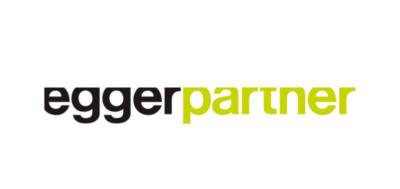
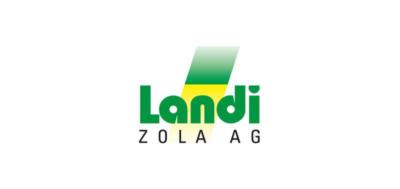
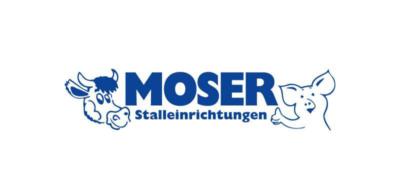
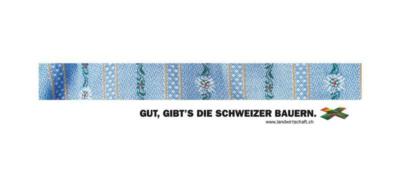
Impressions of the official opening
After ten years of planning and two years of construction, the official opening of AgroVet-Strickhof took place with invited guests on 1. September 2017. At 10 a.m. Ueli Voegeli, Strickhof Director, welcomed the 250 guests in the new forum. Speeches were made by Markus Kägi, District President of the Kanton of Zurich, Michael Hengartner, Rector of the University of Zurich, Lino Guzella, President of the ETH Zurich and Bernard Lehmann, Director of the Federal Office for Agriculture, who represented Johann Schneider-Ammann, member of the Swiss Federal Council.
Documentation of the construction project:
Impressions of the opening on 1. September 2017
Photos by ETH Zurich / Alessandro Della Bella and The University of Zurich / Frank Brüderli.
Speeches at the opening ceremony of AgroVet-Strickhof on 1. September 2017
Below are transcripts of the speeches made at the opening ceremony.
Markus Kägi, District President, Building Director of the Kanton of Zurich
Ladies and gentlemen,
The term «AgroVet-Strickhof» has accompanied me for a very long time. At some point it began to have a life of its own. It created powerful images and represented beautiful buildings of impressive dimensions in familiar surroundings. In the mind of the viewer everything was populated by people and cattle, and then imagination and reality gradually began coming closer together.
Now almost two years after the groundbreaking, it has definitely become a reality. This question may come as a surprise: What, ladies and gentlemen, are we actually celebrating the opening of today?
A dairy barn for two herds, a youngstock barn, a mobile silo, a straw and dry feed storage, a metabolic centre, an office and laboratory building and a forum. Those are the buildings.
Not a satisfactory answer is it? The list of buildings isn't really the heart of the matter. If we look at every element individually, the term «AgroVet-Strickhof» becomes lost. It is in fact a whole which is bigger than the sum of its parts.
No one of its parts are something new, there are an endless amount of them in various formats, these cow barns, silos and offices. But as a whole the world has never seen them before. We are experiencing something special, ladies and gentlemen: how an idea manages to take shape.
At the heart of this idea belong three institutes who got together, all of them of a dignified old age. The University of Zurich exists since 1833, the Strickhof since 1853 and the ETH since 1855. The maximum age difference between the three is 22 years, and this is probably the smallest difference between the three very different institutes. Each has its own history, culture and competence. The fact that they have come together doesn't just happen like that.
Without wanting to overrate the role of the state: The deciding impulse for the cooperation between the three institutes in the areas of veterinary and livestock science came from the state.
At the beginning, the structural change lay in agriculture and the need for agricultural education to find new forms of cooperation. Hence the cantonal government asked Strickhof to become better connected and to look into cooperation possibilities.
Other cantons were considered, but they did not show any interest in contrast to the ETH Zurich and the University of Zurich. In 2006 the cantonal government created the project group AgroVet-Strickhof.
Important elements already existed: the connection between practice and university, a holistic view of the whole value added chain and the usage of spare rooms at the Lindau site.
And the rest is history. A history not without complexity as the construction work was shared by the Kanton of Zurich and the ETH Zurich. But a history that also outshone the view of one-off synergies between the representatives of agricultural practice, the higher education experts and the agricultural and veterinary scientists.
This gave the project a gravitational attraction which I can still feel today. Even the cantonal government was captured by the project: they approved the building loan in 2014 by 167 to 0 votes.
When one now looks at the finsihed result, one feels enthusiasm and thankfulness. The cantonal government deserves our thanks, as well as our project partners and owners ETH and University of Zurich, the political committees, the architects and the planning and construction companies.
I would also like to thank my employees of the Building Management. They come from almost all of the cantonal departments wich demonstrates how unique this project is.
I have already mentioned that AgroVet-Strickhof is more than the sum of its parts. But the individual parts are also imprtant. Norlammy we build hospitals or school buidlings, or we renovate a barock palace or a yoghurt factory. But normally we don't build for chickens and cows.
Now we know how it works. We went through a considerable learning process, which made AgroVet-Strickhof a place of intensive training for us long before operations began. We can expect great things in the future. I look forward to it!
Thank you very much!
Prof. Dr. Lino Guzzella, President of the ETH Zurich und Prof. Dr. Michael Hengartner, Rector of the University of Zurich
Michael Hengartner:
Ladies and Gentlemen,
Today we are opening a lighthouse project which radiates both nationally and internationally. A project which connects agricultural sciences, veterinary medicine and agricultural higher education. I am delighted that the University of Zurich is a part of this new centre for animal sciences.
The close cooperation and spatial proximity between the ETH, University of Zurich and the Department for Agriculture are a tradition at Strickhof. The first Strickhof sitewas opened in 1853 and was located on the current Irchel campus of the University of Zurich. Soon later the University needed this space for its own use as it was growing so quickly. The Strickhof agricultural school therefore moved to the Lindau site in 1976.
Thankfully this spatial distance of the University of Zurich to its partners Strickhof and ETH has been reduced again. I hope that this will result in an increase in leading research results which will consequently benefit animals and people.
Lino Guzzella:
I am also delighted to be in Lindau again today after having celebrated the groundbreaking just two years ago. This remains a fond memory for Michael and I, still boys at heart, as we got to drive a tractor! For the ETH Zurich, ladies and gentlemen, the opening of AgroVet-Strickhof marks a new chapter in a history which began over ten years ago.
At the time, the ETH laid the foundations to strengthen agricultural sciences, with the knowledge that agricultural sciences are crucial for the solution to many core issues of our time: an increasing world population, climate change and sustainable, healthy and affordable nutrition.
The ETH Zurich subsequently created the Department of Environmental Systems Science and the competence centre for world nutrition. It also decided to team up with the University of Zurich and Strickhof in the area of livestock. The idea of the AgroVet-Strickhof project began to take shape.
Michael Hengartner:
Here at AgroVet-Strickhof we lay the foundations for answering important questions of the 21st century regarding animal welfare and animal health. Keeping livestock healthy is not only for our own purpose but is also important from an ecological and economic point of view.
We do this for example by guaranteeing the sustainable production of high quality animal food products. Or by preventing illness 1. in animals, 2. between animals, and 3. between animals and humans.
Veterinary medicine is the link between agricultural sciences, agricultural practice and human medicine both in the food chain and in cohabitation with animals.
Lino Guzzella:
Through the partnership with the University of Zurich and Strickhof not only operational synergies were created but also a considerable added value with regards to content: The proximity between agricultural and veterinary sciences as well as fundamental research and practice is unique and an ideal precondition for new approaches which benefit everybody - a real win win win situation!
Michael Hengartner:
One of these added values is the optimisation of veterinary education. Veterinary students at the University of Zurich learn the whole agricultural value added chain at AgroVet-Strickhof. From feed to the animal to animal food products. «From Feed to Food» or as said in German «from the grass into the glass».
Numerous research projects at the Vetsuisse Faculty will profit from the interaction between fundamental research and applied science. For example through research into stress in livestock. Prof. Heinrich Bollwein, our University of Zurich professor for livestock and reproductive medicine has considerably contributed to better understanding the effects of stress on livestock and to developing new approaches to reduce stress. Another leading position in the area of livestock research is taken by Prof. Mike Hässig, Titular Professor for Clinical Epidemiology and today Deputy Head of Research at AgroVet-Strickhof, as well as Prof. Annette Liesegang, our University of Zurich Institute Director for Animal Nutrition. The research by both scientists has allowed us to better understand the effects of nutrition on the welfare of the animals and on the quality of livestock food products. This knowledge can also be applied prophylactically to prevent illnesses in animals and humans.
Lino Guzzella:
When competing for the best candidates we can offer top infrastructure. This is also valid for the University of Zurich. It is not the only reason, but an important one in attracting top researchers. The perspective of working in such modern research facilties as we are opening today has played a deciding role in engaging new professors.
Besides Michael Kreuzer, our Professor for Animal Nutrition, who closely accompanied the AgroVet-Strickhof project from its beginning, we also gained Animal Physiology Professor Susanne Ulbrich in 2013 and Animal Genomics Professor Hubert Pausch this spring. Their complemeting approches allow for comprehensive livestock research.
Ladies and gentlemen, dear guests: In the name of the ETH Zurich and the University of Zurich I would like to thank everybody who has put their heart and soul into the realisation of AgroVet-Strickhof. One person who could unfortunately not be here today deserves special thanks. It is Roman Boutellier, Vice President of Human Resources until the end of 2014. He was a driving force behind this community project.
I wish our researchers and students who will contribute to AgroVet-Strickhof plenty of enjoyment in discovering the potential which this new platform offers. We can all be delighted and look forward to the continuation of this success story.
Further Information
Our Highlights
- Stations with technical information and expert advice
- Viewing of the dairy barn and all other buildings
- Experience the milking robot and milking stand
- Insight into the respiration chambers
- Agricultural engineering exhibition
- Cattle presentation of young breeders
- Farm market with regional products
- ETH-BigBand performance
- Tour of the ETH research station for plant sciences
- Information on education offered by Strickhof
Our special highlights for small and big children
- AgroVet-Strickhof mini train
- Petting zoo
- Watch chicks hatching
- HF Agro-Technik tractor course
- Build your own mini AgroVet-Strickhof
- Milkshakes from SwissMilk
Catering
- Steak, Bratwurst and Cervelat sausages etc.
- Little chicken with french fries
- Züri-Schnorre and big salad buffet
- Farm ice-cream
- Strickhof burger
- Sunday brunch
"Puure Höck" farmers meeting
On 16.08.2017 the Zürcher Bauernverband (Zurich association of farmers) held the fourth farmers meeting of this anniversary year. Almost 500 farmers and their families used the opportunity to view the new facilities at AgroVet-Strickhof.
Prof. Michael Kreuzer, Institut für Agrarwissenschaften der ETH Zürich, ETH Zürich, presented AgroVet-Strickhof from a research perspective.
For more information please visit: Zürcher Bauer vom 18.08.2017 (in German)
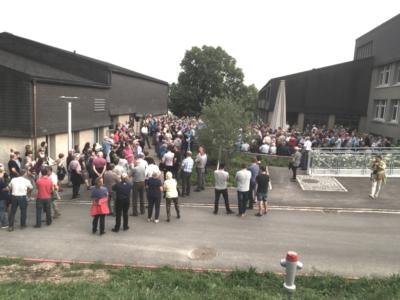
Research award for Hubert Pausch
28.02.2017
Dr. Hubert Pausch, Assistant Professor for Animal Genomics at the Institute of Agricultural Sciences, has received a research award from the H. Wilhelm Schaumann foundation.





